A collection of notes, translations, and the occasional gif.
Don't wanna be here? Send us removal request.
Note
oh and i also meant to ask! now that dragon maid is over, do you think you'll be doing notes for any other shows? your blog is such a benkyou ni naru for me lol
That's the plan! The dragon maid episode 12 notes aren't quite finished yet because Work has been dumping on me, but they should be up next weekend, and after that I'm planning to pick up a new show for this season (and/or work on the backlog of older dragon maid episodes).
4 notes
·
View notes
Note
thank you as always! specifically for episode 11, your explanation for the "どうしてトールがうちに来てくれる気になったのか" line was super interesting, and I didn't even realize it upon first watch. I was thinking about it for a while, and if you stuck a か after the 来てくれる, so "どうしてトールがうちに来てくれるか気になったのか" would this mean it was more kobayashi being curious about tohru's coming to her home vs the line as is, where it's kobayashi being curious about what DROVE tohru to come? or am i totally wrong lol
You are basically correct, yes!
However you'd need to tweak the rest of the sentence a little as well: removing the のか from 気になった (you could put another particle there instead if you wanted, like よ or even a different-use-case の), and making the 来てくれる past tense: どうしてトールがうちに来てくれたか気になった or something like that.
1 note
·
View note
Text
Kobayashi’s Maid Dragon S2 Episode 11 Notes
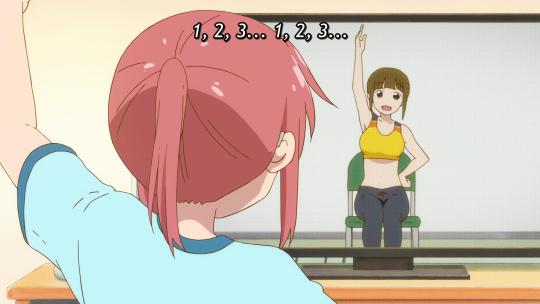
This is ラジオ体操 radio taisou, lit. radio exercise(s). Basically it’s a short series of light stretches intended for general health. It used to be broadcast over the radio (and I guess still is), but is also on TV and internet these days too.
It’s generally popular as a morning thing to kind of get the blood flowing—some companies (apparently around 1/3rd) even have a few minutes in the morning set aside to have everyone do it. Some neighborhoods will hold outdoor public gatherings during summer break, as a morning routine thing for children while school is out. It’s also a kinda stereotypical old-person thing to do.
There are two “sets,” known as radio taisou dai ichi, and radio taisou dai ni (basically “the first” and “the second”), and each has a standing version and sit-down version for improved accessibility.
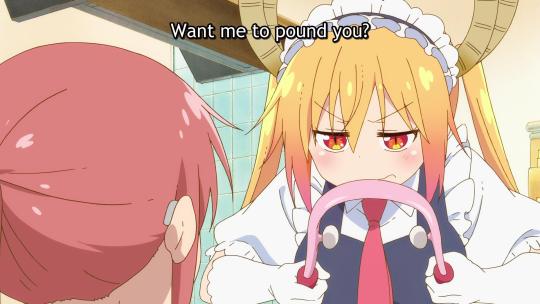
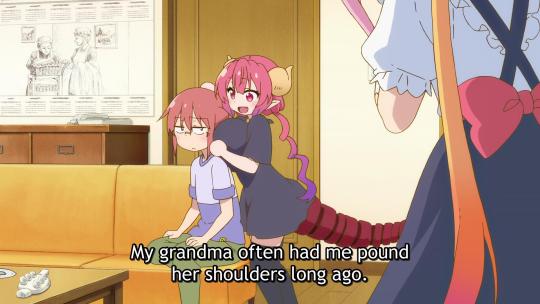
“Pound (shoulders)” here is 肩たたき kata-tataki, a type of shoulder massage that involves lightly bopping the recipient’s shoulders with the bottom of your fists. It’s a stereotypical thing for kids to do for parents/grandparents (remember the shoulder massage tickets Kanna gave Kobayashi for Father’s Day in ep 8? same thing).
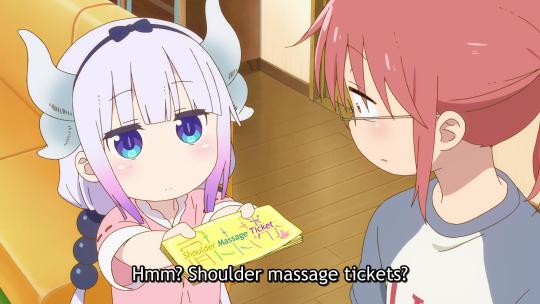
I honestly have no idea how effective it is.
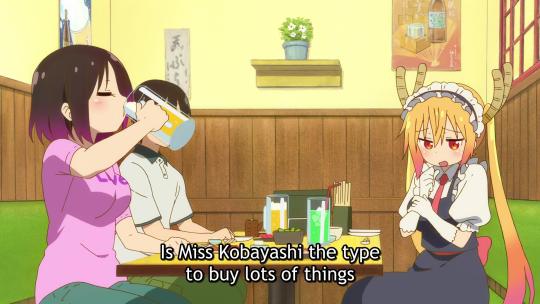
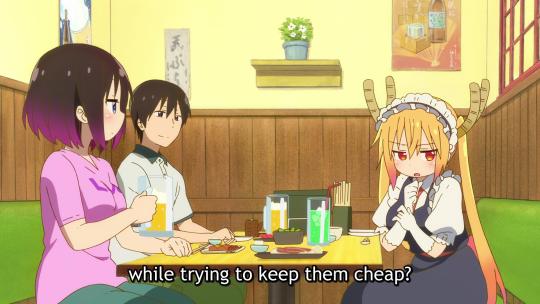
小林さんは安く済ませようとして、色々物を買ってしまうタイプなんでしょうか?
For clarity here, the idea is less that Kobayashi tries to buy lots of stuff for cheap, but that she wants to solve whatever problem on the cheap, and ends up wasting a bunch of money on several cheapo purchases that don’t really help.
Another angle on it might be like:
“Could she be the type who tries fixing a problem cheaply, but ends up paying more for less?”
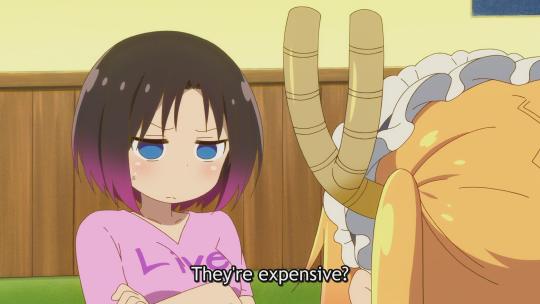
Just a bit of trivia, but in the manga Elma answers this question about computer chairs by saying “Yes, a good one costs as much as 1,000 cream buns.”
That’s our Elma.
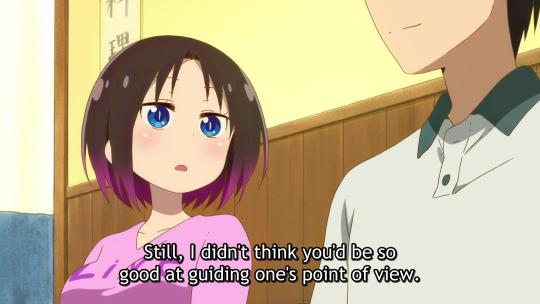
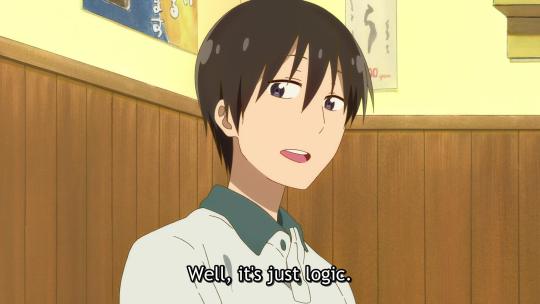
Takiya’s word for “logic” here is 理屈 rikutsu. Rikutsu does mean “logic,” but it has another use too: referring to something that relies excessively on “theory” vs. practical application/real experience, or a kind of “forced” logic.
Basically here he’s saying this out of modesty, not like “the solution was only logical.”
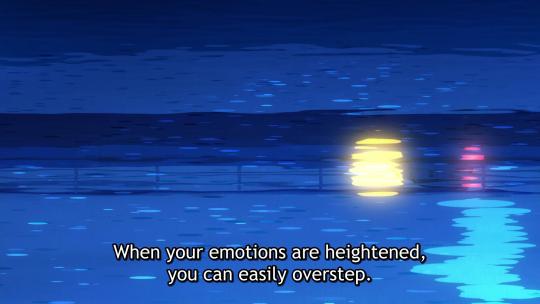
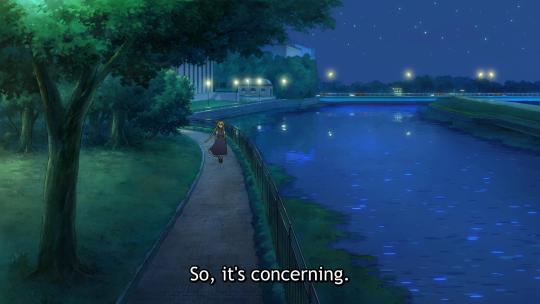
This “concerning” is 危うい ayaui, an adjective describing something that’s in a perilous situation, kind of like something you’d say “balanced on a razor’s edge” of. It’s typically for less immediately physical types of danger (which would use 危ない abunai instead).
In this case, while it’s true such situations are typically “concerning,” he’s not saying this because he’s concerned per se; he’s saying that situations like Tohru’s, where emotions run high (e.g. romantic relationships), are often fragile because of that strength of emotion.
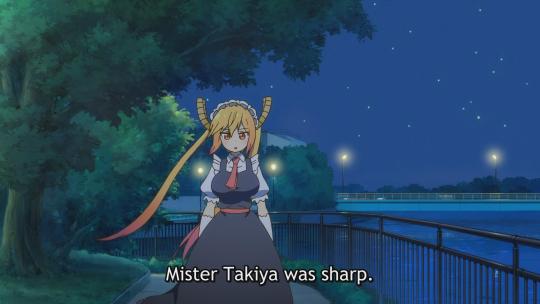
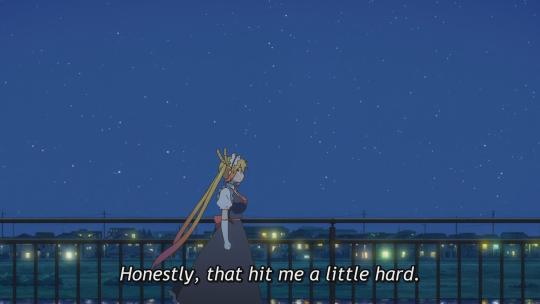
For “a little hard,” Tohru says グサッと gusa-tto. (“Sharp” was 鋭い surudoi, which is basically one-for-one.)
Gusa-tto is one of those sound effect words mentioned in previous notes, used to describe a heavy stab or pierce (literally or figuratively). (If you’ve seen that anime/manga visual gag where someone says something and the words/speech bubble “stab” the other person, that’s a more light-hearted use of this.)
I mostly bring it up here because the “he’s sharp”→”what he said cut deep” was a good pairing of evocative phrasing that we didn’t really get in the English.
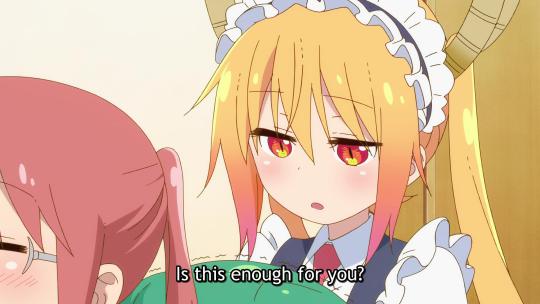
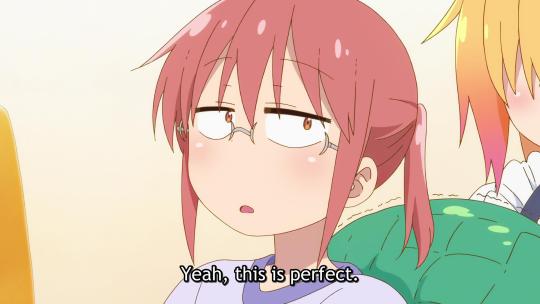
この程度でいいですか? kono teido de ii desu ka? この程度でいいよ。 kono teido de ii yo.
Kobayashi’s answer here is repetition of the question, but changing the “question” marker for a declarative one. Like “Is this enough?” “This is enough.”
I bring it up here for two reasons. One is just because I mentioned the whole repetition thing in a previous episode’s notes, so as an example to help drive that home.
The other is that I have a bit of an issue with the choice of the word “perfect.” Kobayashi is generally a lowkey person (with some exceptions), prone more to understatement than overstatement, so a relatively strong word like perfect is a little out of character for this scene, I would say—especially given the Japanese.
The use of the particle で de in these two lines is also worth noting. In this context (where you’re talking about whether something is what you want), de ii and ga ii have two distinct meanings. With de, it’s “good enough.” With ga, it’s not just enough, it’s actively what you want. If you’ve seen romance shows where one person has low self-esteem, you’ve likely heard a question like “boku de ii?” answered with ”kimi ga ii.”
If there’d been some sort of twist to the phrasing like that, “perfect” might have been a good choice, but as it is I’d have probably stuck with something like “Yeah, this is plenty.” (if maintaining that sentence structure anyway)
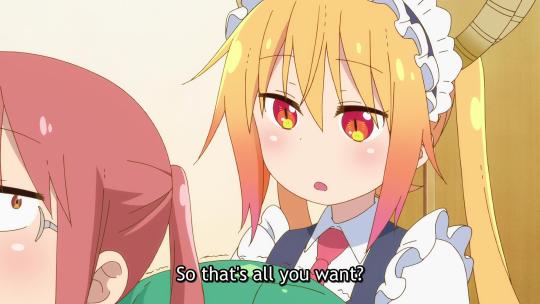
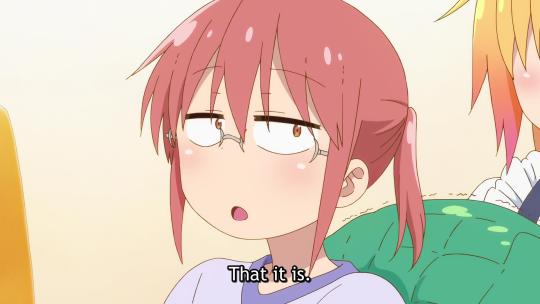

そういうもんですか? そういうもんだよ。 分かりました。そうします。
Just one quick note for clarity on this exchange; the “that/this” they’re talking about is the “what Kobayashi wants” topic, not specifically this tail-chair thing or how fast the tail-vibrations are etc. You likely got that anyway, but I figured I’d mention just in case, since the Japanese wording felt more obvious about it.
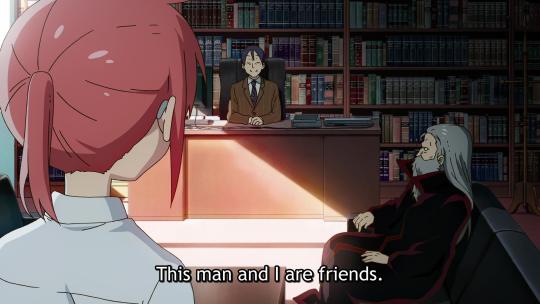
Notably here Daddy Tohru says 知り合い shiriai, which is very explicitly a level or two removed from “friend.” (it’s often translated as “acquaintance”)
They might actually be friends and he just phrases it that way because tsundere, but either way I don’t know if I’d use “friends” here.
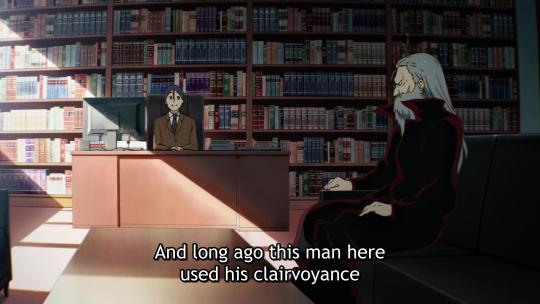
If you’ll recall from the Elma episode, “clairvoyance” there was 千里眼 senrigan. This is actually not that, but instead 未来視 mirai-shi, which is more or less literally “future sight.” It probably won’t really come up again(?), but just as a world-building thing I guess, know that this guy and Elma don’t actually have exactly the same power (at least in this instance).
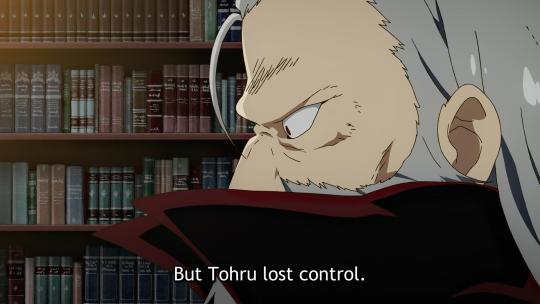
The word for “lost control” here is 暴走した bousou shita, which does basically mean that.
I would, however, like to point out that he’s not necessarily saying Tohru lost control of herself. Bousou means that [whatever] is running wild, but that ranges from a runaway train, to someone going berserk, to someone acting rashly without consulting others.
My point in bringing it up is that “lost control” sounds like Tohru had little/no agency in the decision to storm the enemy’s home ground, which is not really the case and not necessarily implied in the Japanese.
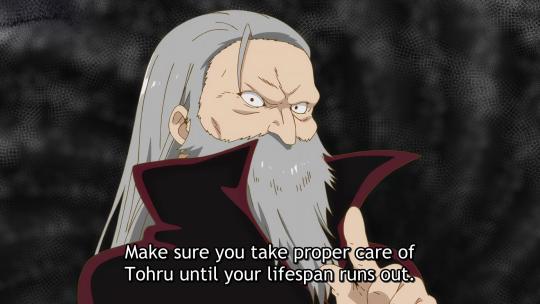
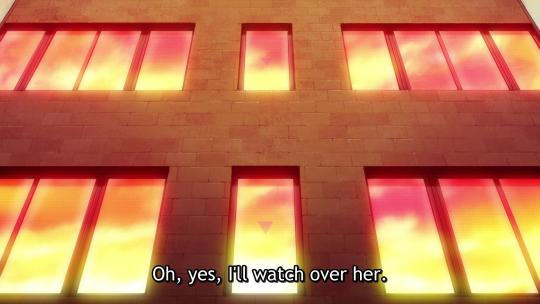
When Kobayashi responds here, she says she, Kobayashi, will be the one getting looked after by Tohru, not the other way around. She flips it 180 degrees from how Dad here says it.
(Since, y’know, Tohru’s the maid and everything.)
Example alt text:
“Make sure you take good care of Tohru until your lifespan runs out.”
“Yessir, I’ll have her take good care of me.”
It’s supposed to give this very heavy and serious scene a bit of levity to end on.
(For the Japanese students: she says [面倒を]見てもらいます, meaning that Kobayashi is having Tohru do the “looking [after].” If she was the one doing the looking after, it would be something like 見させてもらいます instead.
When you stick もらう or いただく after a verb, it’s you having someone else do that verb, not you doing it, so to make it work for “you” being the verb-doer, you have to flip the verb to a passive form. It’s kind of like the difference between “please [verb]” and “please allow me to [verb]”.)
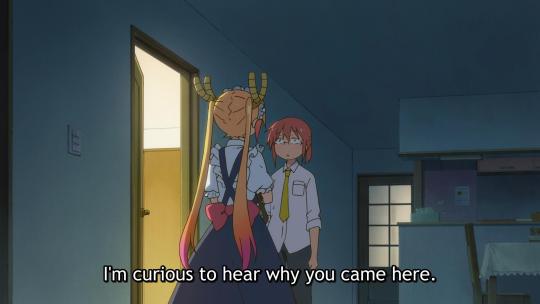
どうしてトールがうちに来てくれる気になったのか
Two small things about this line. First: the “came here” is うちにきてくれる uchi ni kite kureru. The two words I want to mention are uchi, which is like “my/our place” (like “wanna come to my place?”), and kureru, which is used as a helping verb to denote that a verb was done for someone else.
So basically the Japanese adds two extra layers of… emotion(?) to the “came here.” That is, “here” is specified as Kobayashi’s home (vs “here” being more vague and could just mean “this world”), and the “came” is conjugated in a way that expresses Kobayashi sees Tohru’s .
The second, more minor, is that it seems like the English took the 気になった ki ni natta and changed it from talking about Tohru to talking about Kobayashi.
Ki ni naru can mean to take an interest in something (“I’m curious”), or when attached to a verb, can mean “got the will/motivation to do [verb].” In this sentence, it’s attached to the verb phrase uchi ni kite kureru, so meaning more like “why you chose to come here.”
(That said you could easily leave the “curious to hear” part there in the English too though, since that still makes sense for her asking a question like this.)
(Basically the English reads like a translation of どうしてトールがここに来たのか気になった instead of the line in question.)
So like as an example alt:
“I’m curious what moved you to come live with me.”
Which still doesn’t fully grasp that kureru, since that’s a hard thing to just “slip in” in English, but does hit a few other relevant notes and should still be okay length-wise (cursed subtitle restrictions!).
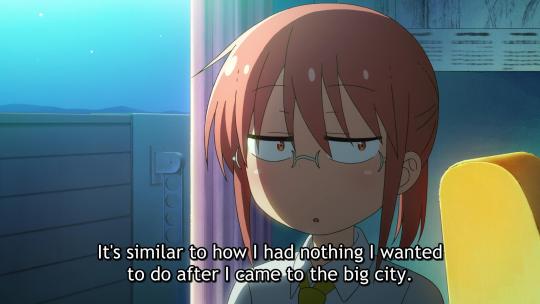
The phrase for “[move] to the big city” here is 上京 joukyou. It combines the characters for “up” and “capital” (of a state/country) and is used as a verb for moving to the capital—these days, specifically Tokyo.
(It used to mean moving to Kyoto, and I’m told it annoys some old-school Kyoto-ites if you use it to say moving from Kyoto to Tokyo, lol.)
16 notes
·
View notes
Text
Kobayashi’s Maid Dragon S2 Episode 11 one quick note
Just one quick note now—before the full notes write-up—since I just watched the episode and this stuck out as a missed TL:


When Kobayashi responds here, she says she, Kobayashi, will be the one getting looked after by Tohru, not the other way around. She flips it 180 degrees from how Dad here says it.
(Since, y’know, Tohru’s the maid and everything.)
Example alt text:
“Make sure you take good care of Tohru until your lifespan runs out.”
“Yessir, I’ll have her take good care of me.”
It’s supposed to give this very heavy and serious scene a bit of levity to end on.
(For the Japanese students: she says [面倒を]見てもらいます, meaning that Kobayashi is having Tohru do the "looking [after]." If she was the one doing the looking after, it would be something like 見させてもらいます instead.
When you stick もらう or いただく after a verb, it’s you having someone else do that verb, not you doing it, so to make it work for “you” being the verb-doer, you have to flip the verb to a passive form. It’s kind of like the difference between “please [verb]” and “please allow me to [verb]”.)
12 notes
·
View notes
Text
Kobayashi’s Maid Dragon S2 Episode 10 Notes
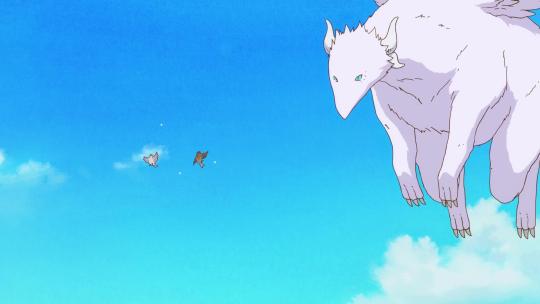
I’m extremely not an expert in birds, but I tried to look these up to see if they were a species native to New York (since they’re similar to the sparrows we usually see around Kobayashi’s place). Apparently there are few similar-looking species in New York? My totally uninformed guess is that they may be house sparrows.
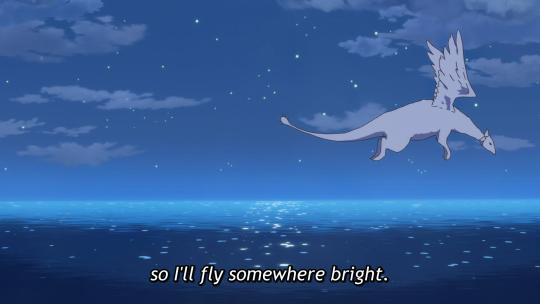
The sun sets in Japan relatively early (probably around 6:30pm when this episode takes place), which would make it entirely plausible that if she just flew east (with a slight northward angle) she’d find herself over New York in the early morning while most of the rest of the country is still dark.
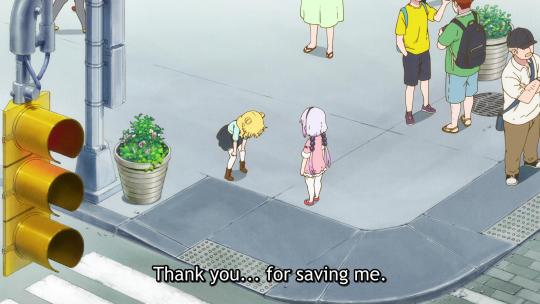
These bumpy grey pads at the pedestrian part of the intersection here are known as (among other things) tactile paving; they’re to assist people who can’t fully rely on eyesight to get around.
Interestingly (imo), they were actually invented in Japan in the 60s (by a Miyake Seiichi), where today they’re extremely ubiquitous. They even show up later this episode!
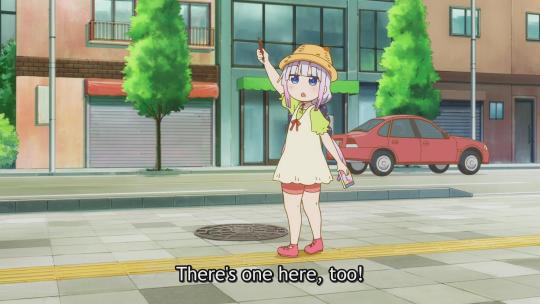
They’re often referred to in Japan as 点字ブロック, tenji (Braille) blocks, and they tend to come in two types: the “dot” design, which indicates a place to stop (or an angle change, or more generally “caution”), and the “line” design which indicates you can safely keep going. They’re generally colored yellow in Japan, ideally making them stand out more to help people with impaired vision find them, and are mandated by law in most places public transport can be found (among others).
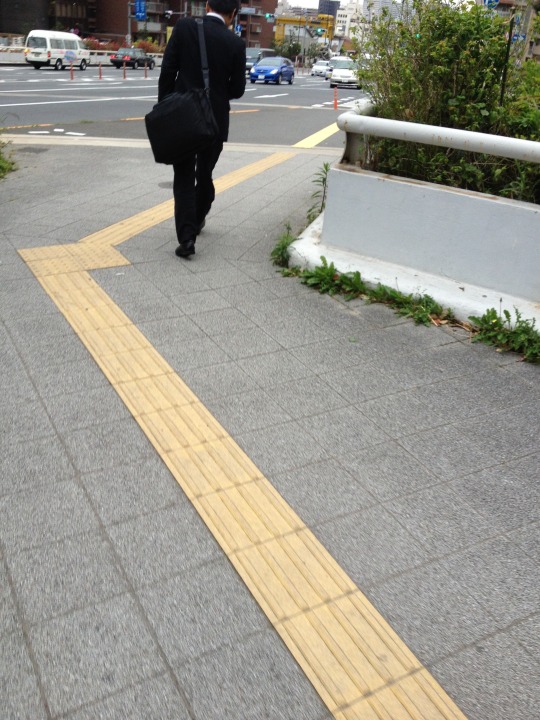
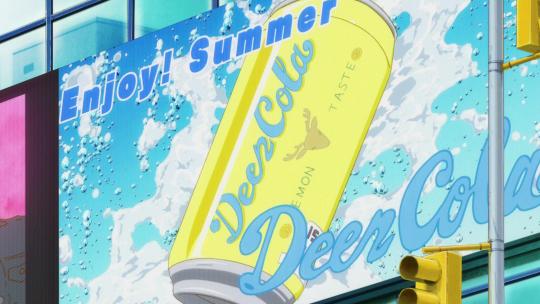
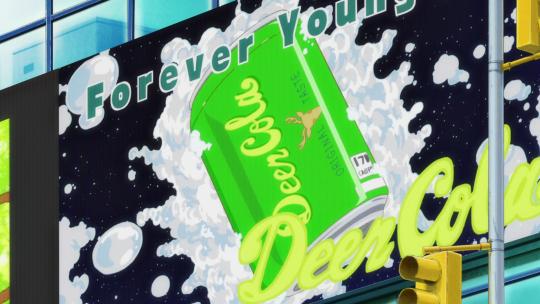
Not really a translation note, but “deer cola” felt especially funny in the context of all the horse medicine stuff.
I guess “[animal] [drink]” is a common branding device in-universe, given the crab beer Kobayashi’s always drinking.
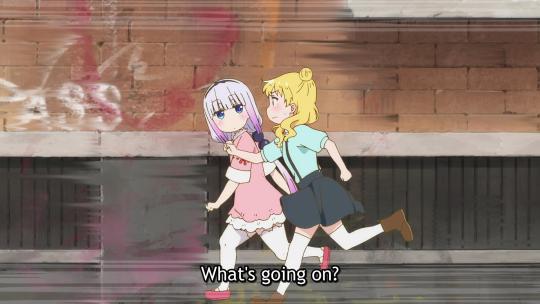
Also not really a translation note, but the difference between how “hard” Kanna and Chloe are running to be at the same speed was a nice animation touch.
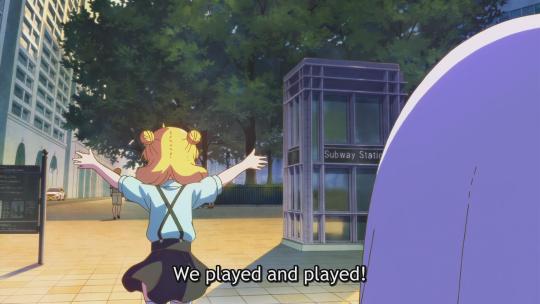
遊んだ遊んだ! asonda asonda!
One feature of the Japanese language is a very heavy use of repetition. This includes “reduplication,” a linguistic term for creating words by repeating a root (e.g. a “boo-boo” in English or the dara-dara example below in Japanese), but also just like… saying the same word multiple times, as Chloe does here.
Typically this is done for emphasis or to help increase clarity: if you’ve worked in a Japanese office, you’ve likely heard someone in a phone conversation say desu desu in response to someone asking for confirmation.
This acceptance of repetition sort of extends beyond the obvious uses like this as well: for example, personal pronouns are much less common; instead (if the subject isn’t dropped) you’ll often just use the person’s name again. You’ll notice similar trends with other types of words as well.
Not to mention the ubiquity of things like otsukare.
This often ends up being a challenge for translators, because reusing words in English (when it’s not for an obvious reason) tends to stick out rather unflatteringly, even if they aren’t that close together.
(Like when I overuse “hence” in these notes.)
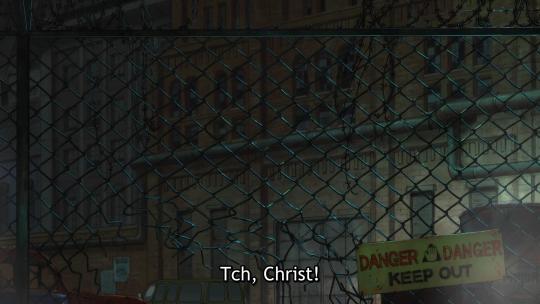
This “Christ” in the Japanese was “ったく” (short for 全く mattaku, but just used as a semi-generic exclamation). I mostly bring this up because it’s a good example of a word that doesn’t work out of its cultural context; e.g. it wouldn’t make any sense for a fantasy character to say “Christ,” but since this is an American speaker it works just fine (and helps distinguish that fact, even).
I think I’ve mentioned this before, but English uses a lot of “explicit reference” words like this, that can break immersion if put in the mouths of characters who wouldn’t have exposure to said reference—which can be annoyingly limiting when trying to write dialogue sometimes.
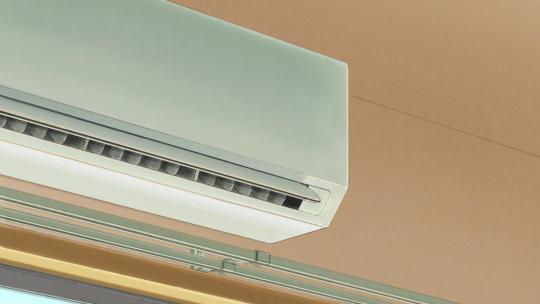
As a bit of a culture shock for a lot of Americans I’ve met, most Japanese homes tend to have wall mounted air conditioning units, like this one, that are only for heating/cooling the one room they’re in. (Many also have a “Dry” setting that makes them act kind of like a dehumidifier as well.) It’s common to not have them in every room, like bedrooms, however.
This is in contrast to the central air conditioning system used by a majority of homes in the US (though type/use of AC in the US varies a lot by region; less common in the north for example)—and places like the UK where apparently residential AC units of any kind are quite rare.
You may have noticed that the doors between rooms always seem closed in Kobayashi’s apartment. That’s not just to make the backgrounds simpler, it’s also a good habit to keep if you’re going to be running the AC!
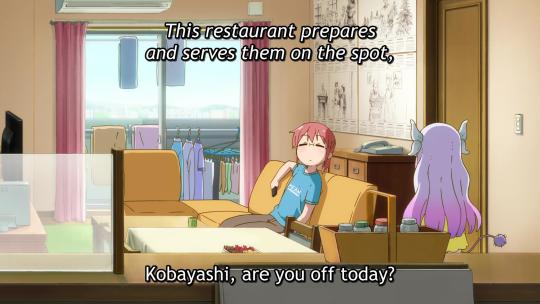
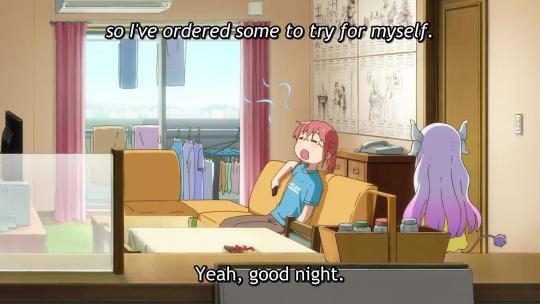
“Kobayashi, are you お休み today?”
“Yeah, お休み.”
お休み o-yasumi, is a noun form of the 休む yasumu, to rest. The word has a variety of applications, as we see here. A day off work/school, i.e. a rest day? お休み. Want to say “good night” to someone before bed? Also お休み.
In this case, it’s not even necessarily clear it’s being said as a pun; as mentioned earlier, repetition is a common feature of the language, so despite the yawn there wouldn’t really be any reason for Kanna to think Kobayashi was about to go to nap or anything.
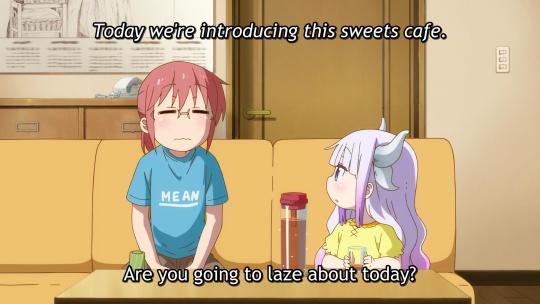
“Laze about” here is だらだら dara-dara, another phenomime (擬態語 gitaigo in Japanese)—one of those words that mimics the “sound” of an idea/concept/state, which don’t actually make a sound per se.
These phrases aren’t necessarily childish or anything (overuse of them can be, but you can find them even in news articles and political speeches for example). They are, however, used frequently by children, and by adults talking to children, as they’re very “easy” words: they’re expressive, they capture useful daily-life concepts, and they usually roll off the tongue. You’ll notice, for example, that Kanna uses them a lot.
Kanna has a very interesting way of talking actually, which I’ll touch on a bit more later.
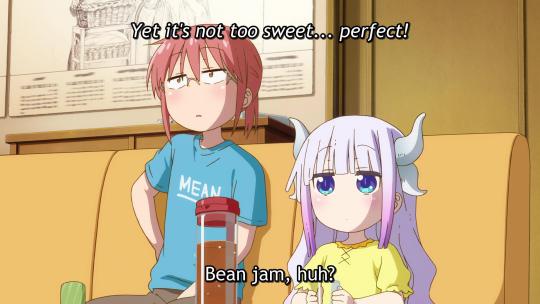
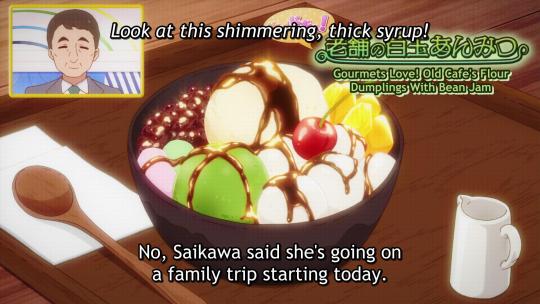
Kobayashi’s “bean jam” here is あんみつ anmitsu, a traditional Japanese dessert (technically a spinoff of mitsumame). It typically is a mix of red beans (and/or red peas), agar (an algae-based gelatin equivalent), some fruit, some variety of rice flour product (shiratama in this case, similar to mochi), and a syrup (often black sugar based).
You can find it year-round, but it has a strong summer association and is even used as a summer season word. (It’s typically chilled and you can often get it with ice cream as an ingredient.)
It’s also sometimes paired with a green-tea flavored something as well (e.g. ice cream, agar, or syrup). The trinity of green tea, red beans (aka azuki), and shiratama makes what I like to think of as the “Japanese S’mores Flavor (for Adults)”. No I will not elaborate on this.
I will though point out the shaved ice flavor Kobayashi ordered later in the episode:
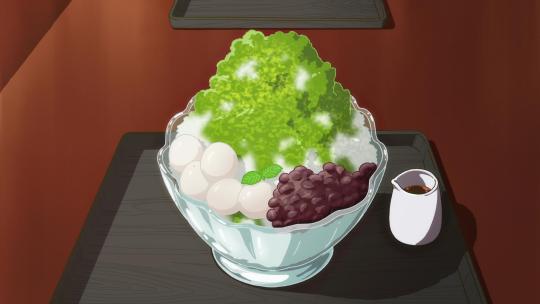
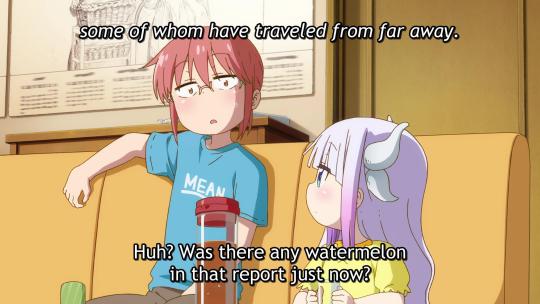
え?今スイカ様子あった?
A word of note here for language learners is 様子 yousu, which has a lot of definitions, but in cases like this where it’s attached to a noun or phrase means roughly “the appearance of __” or “an indication of ___” etc. In actual use, it typically means something that makes you think of whatever ___ is—or the lack of something that would make you think ___.
For example here, it’s like “Watermelon? Where’d that come from?” (since the TV was talking about a different dessert-y food entirely).
Or an unrelated example: “I think that guy is hiding something” → “Really? I haven’t seen any yousu of that.” In other words, it can be a lot like “sign,” as in “I’ve seen no sign of ___.”
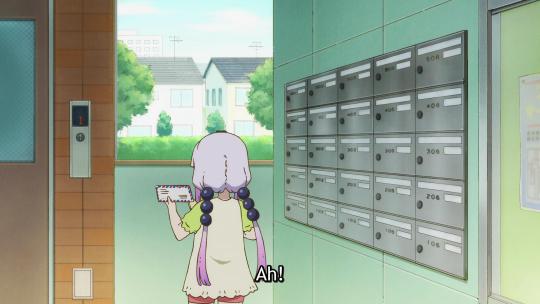
These color-bordered envelopes (originally colored based on the flag of the country of origin) used to be the standard for air mail, domestic or international, though they haven’t been required for several decades.
That said, they’re still popular for that “ooh, international mail!” feel (at least in Japan) and you can buy them at most places that sell stuff like envelopes. As here, they’re often used in media to immediately convey that a letter came from outside Japan.
Kanna (and Kobayashi) says エアメール, lit. “air mail” in English, which is used colloquially for international mail specifically, rather than “mail sent by plane.”
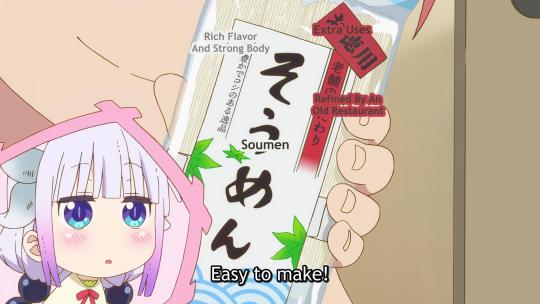
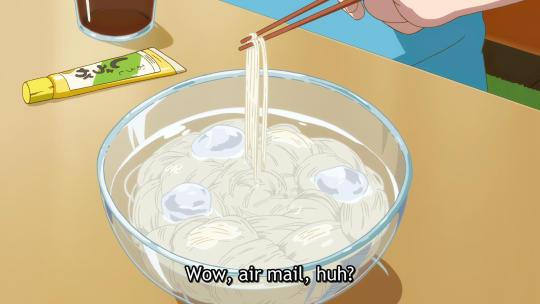
They’re having what’s called 冷やしそうめん hiyashi soumen, chilled/cold soumen for lunch here. (Soumen being a thin wheat noodle; udon but thinner.) As Kanna says, it’s very easy to make!
Basically you just boil it, wash it in cold water, add ice, get some sort of sauce to dip it in, and you’re done! It’s a popular quick meal in summer, and much easier than the more involved nagashi soumen setups you may have seen elsewhere, where they slide the noodles down a chute for you to try to grab and eat. (It’s basically the same meal aside from that though.)
(You can of course add more to it, but as we see here, you don’t really have to.)
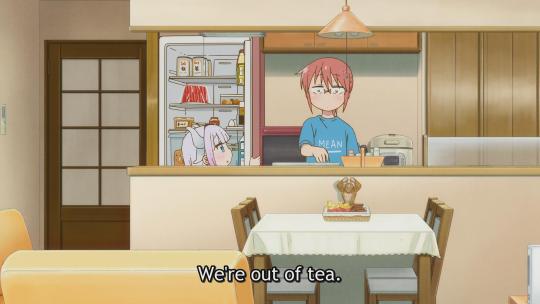
The type of tea here, for the curious, is 麦茶 mugicha, barley tea. Mugi is the general name for cereals/grains including wheat (komugi), barley (oomugi), rye (kuromugi or rye mugi), and oats (enbaku or oat mugi). It’s incredibly common in Japan (and much of East Asia), where it's the household summer drink.
It has no caffeine like many other teas, and has a bunch of various nutritional benefits, so it’s considered a good way to stay hydrated as you’re sweating buckets in the muggy Japanese summer weather.
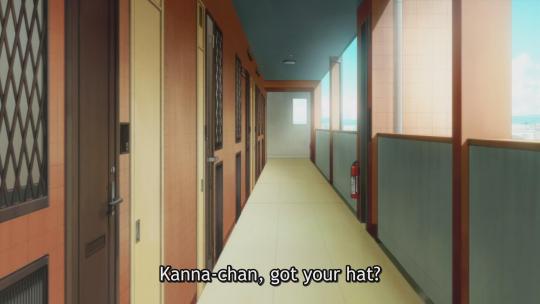
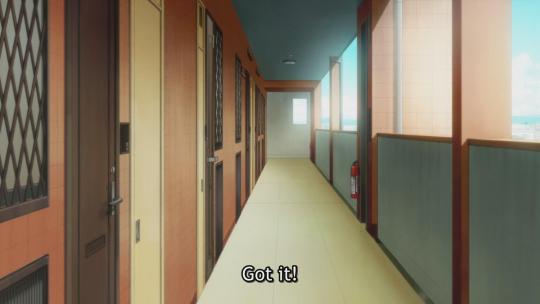
帽子した? boushi shita? した! shita!
I thought this was a cute way of phrasing this question/answer, and a good example of the “parent and their young child” way these two talk.
The suru (past tense shita) verb used here is the ultimate in “generic verb,” and it basically doesn’t get any simpler grammar-wise to phrase something as “noun+suru” like Kobayashi does here (even the particles are dropped).
Kanna, for her part, doesn’t respond with a “yes” or etc, but instead just repeats back the verb itself in confirmation.
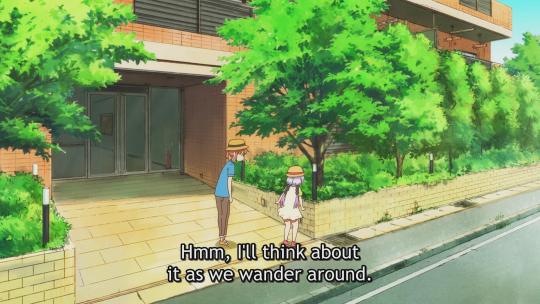

Just to note another one of those words like dara-dara: bura-bura, used for things like wandering around, doing something (or nothing) casually/aimlessly, or (with one bura) for something dangling/swinging in a more literal sense, like a spider, slack yo-yo, or wind chime.
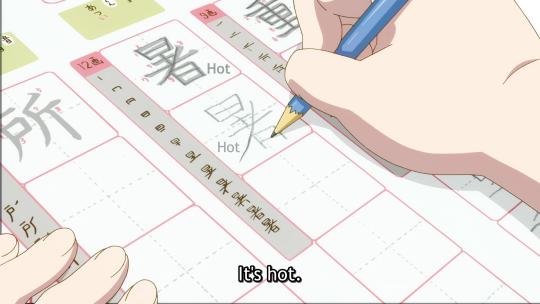
These booklets are a common homework assignment for practicing kanji; you can see along the left side there it shows the stroke order, with the first block giving an example to trace over & showing where to start each stroke.
Each character is made up of radicals (e.g. “hot” above: 日 and 耂), which each have a standard way to write them. There’s 214 such radicals (though many are pretty niche; only about ~50 of them are needed to make most characters), and once you get a hang of them it makes learning new characters much easier (not too different from learning word spellings in English imo).
Kanna is repeating out loud the reading for the “hot” character as she writes it.

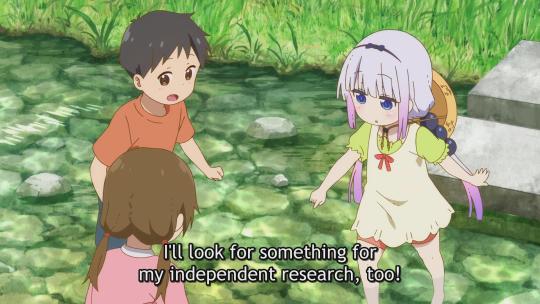
In addition to the above workbooks (which usually involve both kanji and math problems at Kanna’s grade), elementary school summer homework in Japan typically involves doing an illustrated diary (not a daily one necessarily) and some sort of research project about a subject of your choice. (Think kind of like a small science fair project).
The “research” project part is pretty expansive, and you can typically even do something more arts & craftsy for it.
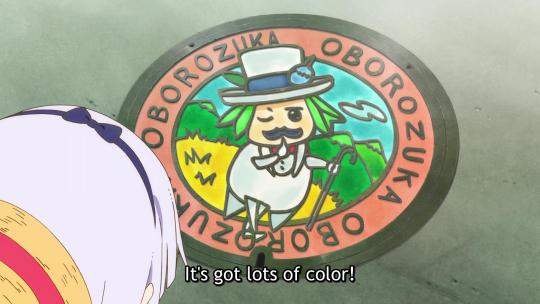
Manhole covers in a lot of Japanese municipalities feature art representative of the area. For example, the city of Chofu, where the author of GeGeGe no Kitaro lived most of his life, has several with art of that series.
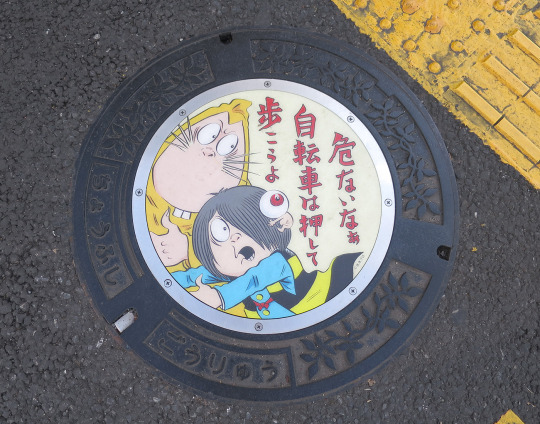
(Photo from https://www.gotokyo.org/jp/spot/1734/index.html)
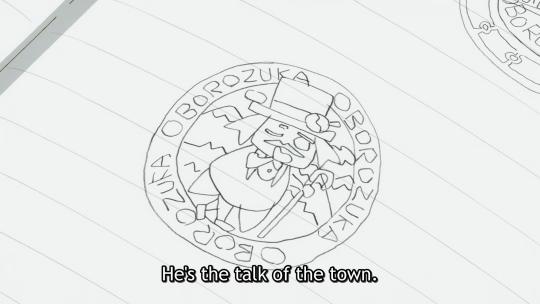
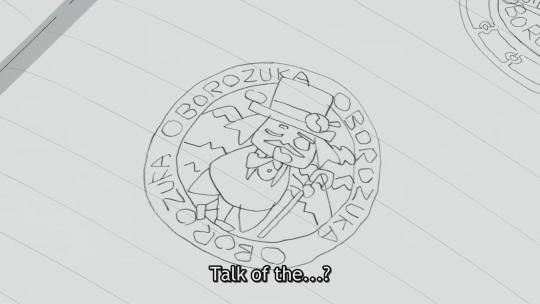
I mentioned earlier that Kanna has an interesting way of speaking. Probably a better way to put it is that she has a pretty convincingly childish way of speaking (despite the monotone). That is, she uses simple grammar and “easy” words most of the time, but then throws out random big words and fancy idioms from time to time that make you go “...where did you learn that?”
In this case, the phrase she uses is 巷で人気 chimata de ninki. Chimata originally means like a fork (in the road), and since those are often places with lots of people passing through, it expanded to mean “the undefined place where people talk about ~stuff~.” So it’s used for “many people are saying~” or “word on the street is~” types of situations (or “talk of the town,” as here).
It’s kind of an “adult” word though; for example the character for it isn’t included in the jouyou kanji (the 2000+ that are taught in elementary through high school). Hence Kobayashi’s reaction here.
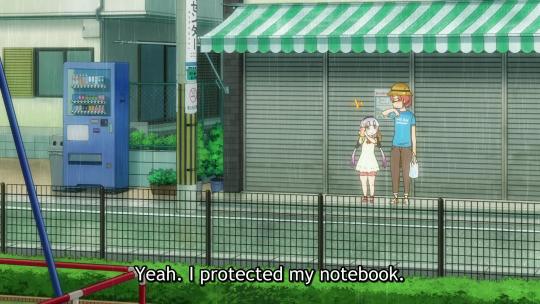
The word she uses for “protected” here is 死守 shishu. The word is the combination of the characters for “death” and “protect,” ~meaning to protect something even at risk to one’s life (to the death, as it were).
It's a word that you learn in third grade in the Japanese education system—the same grade Kanna is in!
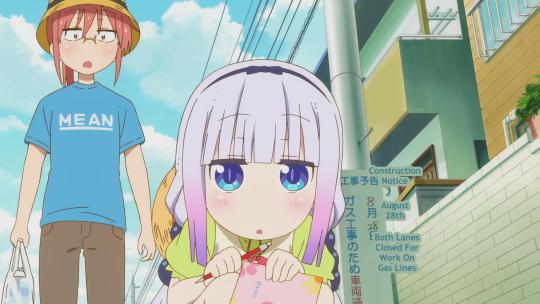
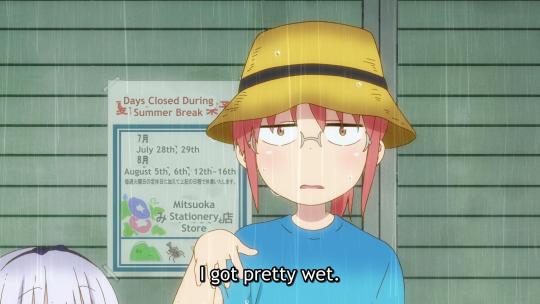
Both of these types of signs are common sights in residential areas like this: depending on where you live, it can feel like there’s always some sort of construction project going on, and Japan’s many family/individually-owned businesses like this tend to be closed on various extra days during the summer (and certain other times) to allow for time off.
In this case, them being closed August 12th~16th implies they’re taking off for Obon (and probably leaving town to visit family).
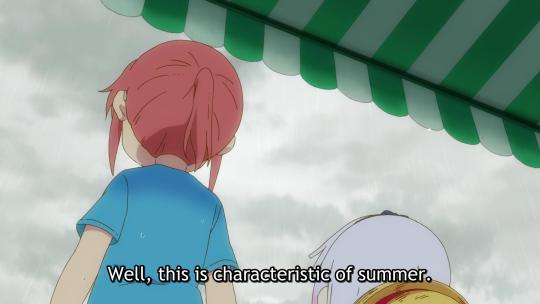
The word Kobayashi uses here is 風物詩 fuubutsu-shi. Fuubutsu refers to something that makes up part of the “scenery” of a place or season, in a pretty broad sense. This shi typically means “poem.”
So fuubutsu-shi is originally a type of poem celebrating a season or a scene of natural beauty, that sort of thing. From that, it’s also now (more popularly) used to describe things that are representative of a season; the kind of stuff you say “it’s not winter until…” about, or “you know it’s summer when…” (It can also be used for places + seasons, like the ice sculptures of Hokkaido winters, or even summer Comiket in Tokyo.)
They’re very similar to the season words I’ve mentioned previously, though they’re far less strict about what counts as one. Here, Kobayashi’s could be referring to the whole package experience of “having to take cover and wait out a sudden heavy rain, despite it being mostly clear skies a few minutes ago,” which you could call fuubutsu-shi (summed up probably as like 夏の雨宿り etc.)
In contrast the relevant season word here would probably be yuudachi (or niwaka-ame), a word referring to the short, sudden bouts of rain that tend to fall (from cumulonimbus clouds, the makings of which are noticeable in the backgrounds before this) on summer evenings.
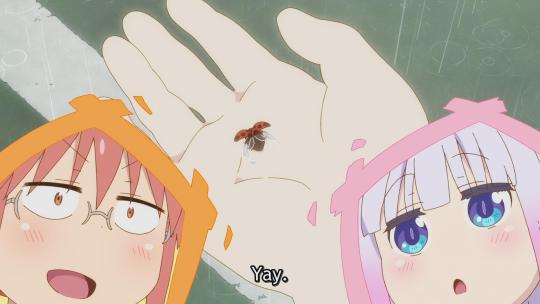
Feels like in season one she woulda eaten it. Three cheers for character growth!
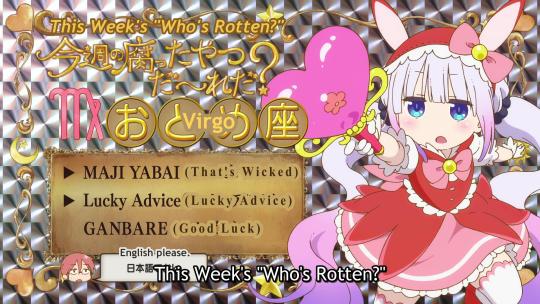
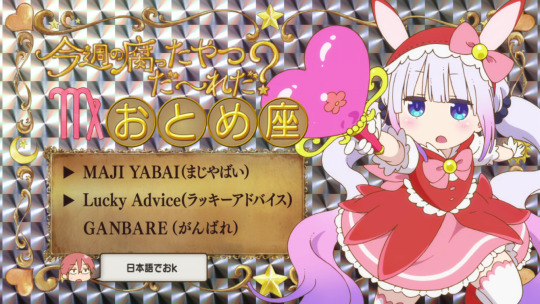
The parentheticals there are just the “English” in hiragana/katakana.
Kobayashi’s comment (nihongo de ok, roughly “you can just use Japanese”) is an internet-born term people originally would use to reply to someone who said something that didn’t make any sense, had terrible grammar, or was so full of katakana loanwords it was hard to read etc.
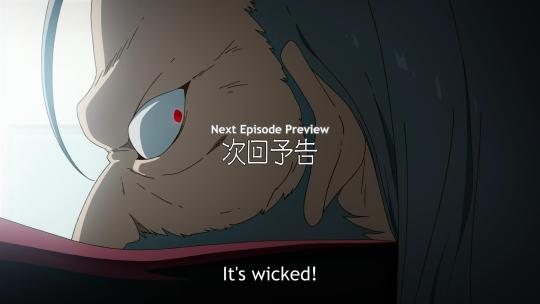
Kanna says this line in English, and while I have no proof at all, my guess is that the specific choice of “wicked” was taken from the translation of “maji yabakune?” used in season one.
14 notes
·
View notes
Text
Kobayashi’s Maid Dragon S2 Episode 9 Notes
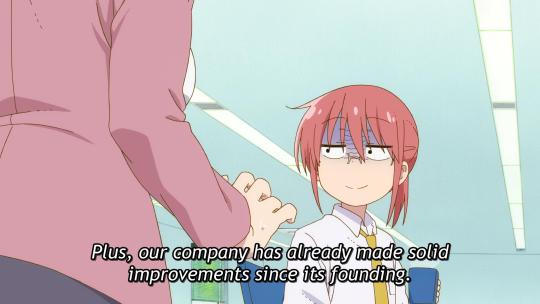
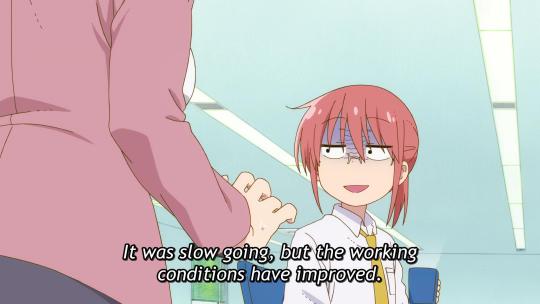
...設立から大分地盤が固まってきており、少しずつだが、業態は改善されている。
One thing to note here is that Kobayashi(‘s narration) isn’t saying the company has already made solid improvements, it’s that the company has finally established itself somewhat (as it was only founded relatively recently, and typically new companies are especially busy while trying to get off the ground) and now is starting to make improvements.
Similarly in the second sentence, it’s not “was” slow going, it’s “is still” slow going, and the working conditions “are” improving, not “have improved.”
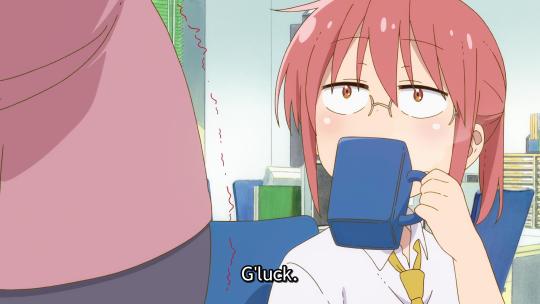
This is がんば ganba, short of course for がんばって ganbatte, which I’m sure most of you are familiar with: the (in)famous “do your best.”
I only mention it because I like this shortened version of it. Ganba!
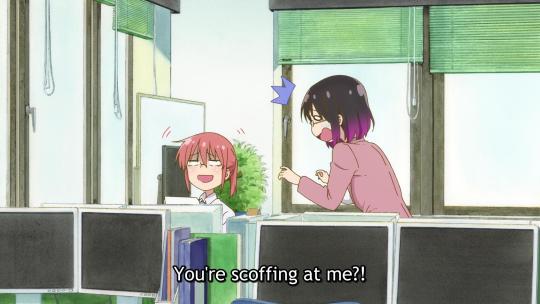
This is a fun little idiom(?)/saying: 鼻で笑う hana de warau (conjugated as hana de warawareta), lit. to laugh using the nose. It’s used to describe laughing at someone you’re looking down on for whatever reason (not necessarily in a super serious way, could just be a friend being dumb etc.; in this case it’s Elma’s being naive).
Typically it refers to like a “heh-but-through-the-nose” kind of “laugh,” but as you can see in this scene (where clearly Kobayashi is laughing with the mouth, even starting with “pff” lips) it works idiomatically even if the laughing isn’t only through the nose.
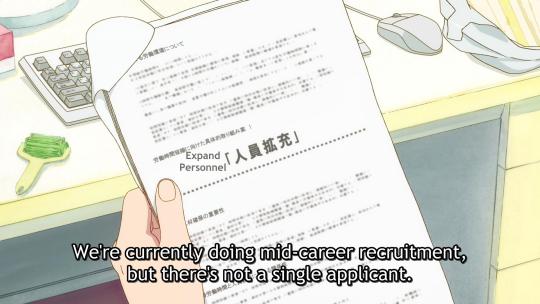
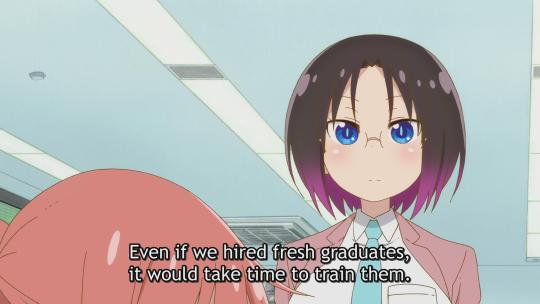
You may have heard that Japan is/was a “lifetime employment” country, where typically people would get hired right out of school and stay at that company until retirement. While that’s much less true today than it was even a couple of decades ago (and has become kind of controversial in ways), it’s still much more common of a practice than in say the US.
One result of this is that there’s a much bigger distinction placed between hiring people in spring as part of the annual graduation rush (the Japanese school year ends in March), and mid-career hiring. Typically you can’t participate in the fresh grad hiring if you aren’t one, even if you’re new to the field in question.
For larger employers (i.e. 5k+ employees), roughly two-thirds of all hirings come from fresh grads, and only small employers (<300 employees) hire more mid-careerists than people directly out of school.
Of course, this split tends to apply mostly to “standard” full time jobs, not so much part time, and is not necessarily a thing in every industry/at every company.
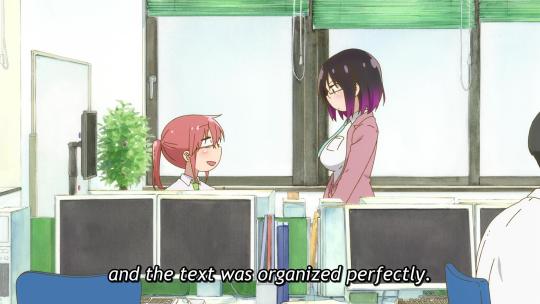
Just as a minor point of clarity, this “organized text” in Elma’s document refers to the phrase まとめられた文章 matomerareta bunshou. In a literal sense, matomerareta can mean organized/consolidated etc., and bunshou text/passages, but meaning-wise it’s more like “writing that gets its point across clearly/cleanly.”
This is a pretty big compliment and a very useful skill to have in organizations like this, as writing such that people can quickly and easily understand exactly what you’re trying to say often saves a ton of time and frustration.
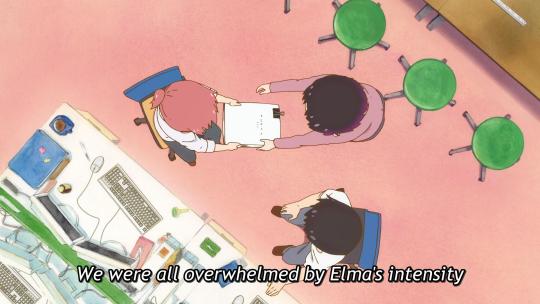
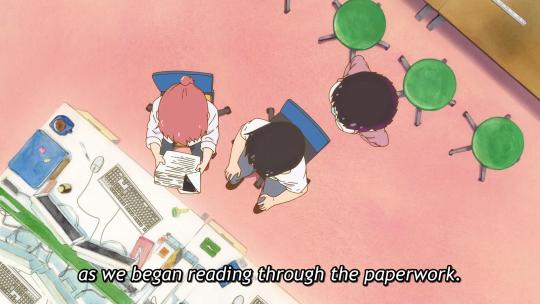
我々はエルマの気迫に押されるがままにその書類を読み始めた。
Another minor point, but where the English could imply that they were overwhelmed by Elma’s intensity through the act of reading her report, the Japanese implies more that they started reading it because of how intense Elma was being.
It doesn’t really make much of a difference either way, but it stuck out a little for me.
To justify mentioning it, I guess I’ll explain the grammar point Kobayashi uses: されるがままに sareru ga mama ni. Sareru is a generic verb/verb conjugation for having something done to you (technically here it’s 押される, to be “pushed/pressed/pressured”), and mama refers to a state, condition, or “way” (like “do it this way”).
Put together, the whole phrase is used to indicate “you” do/did something that someone else wants you to, without (meaningful) opposition. (Something similar in raw meaning but with a very different connotation would be “going with the flow.”)
If a friend says “hey let’s go do something,” and next thing you know you’re out bowling despite preferring to stay at home, this is you.
You can stick the mama ni to various other things as well to come up with a similar idea, but without the sareru the nuance may end up different.
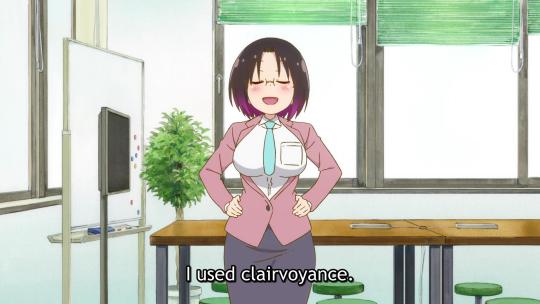
The word for clairvoyance here is 千里眼 senrigan, lit. “eye(s) [that can see] a thousand li”, li being a Chinese unit of measurement for length (shorter than a mile, but for general purposes “eyes that see a thousand miles” is basically the gist).
Despite the perhaps physical-sounding nature of the term, it does actually describe the same power as “clairvoyance” in English: being able to perceive things outside your actual range of vision, including potentially into people’s hearts and minds etc.
Hence why it’s a thousand screen display, when she updates it with tech knowledge:
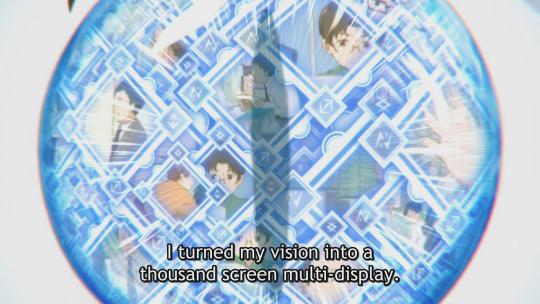
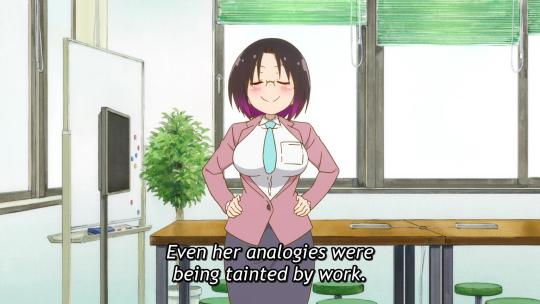
“Tainted by work” here is 職業病 shokugyou-byou, lit. an occupational disease. The “proper” definition is a disease one gets from working in a particular job, such as black lung for coal miners or even posture-related health issues for desk workers.
Additionally, it’s used colloquially to refer to noticeable habits or quirks that people in a certain profession pick up, like a baker always waking up super early or a programmer using programming lingo out of context in normal conversation. The latter being especially noticeable in Japanese, as a lot of such terms are English in origin.
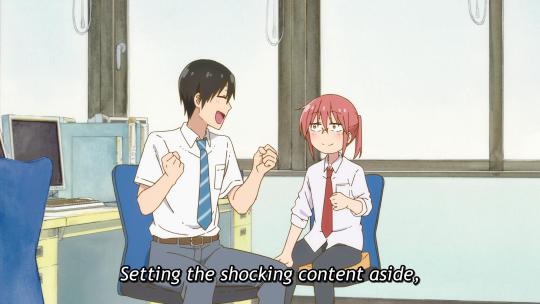
“Shocking” here is a fun word: ドン引き don-biki. “Don” here is added just for emphasis; the main meaning revolves around 引き hiki/biki, from the verb 引く hiku, meaning to pull.
The idea is that someone does/says something that you recoil from. Maybe it’s gross (“I only shower once a week”), maybe it’s mean (“They didn’t smile enough so I didn’t leave a tip.”), maybe it’s creepy (“I sent like 30 texts yesterday but still no reply.”), just anything that has you feeling like you might want to create some distance because... phew.
It’s kind of similar to the current use of “cringe” as an adjective/noun, though with less of an internet-slang feel* to it, and generally used more as something the speaker is doing rather than describing whatever/whoever is being cringe.
(*I think it started being used popularly in this way in the early-to-mid 90s, with the “don”biki variant specifically popping up around 2005.)
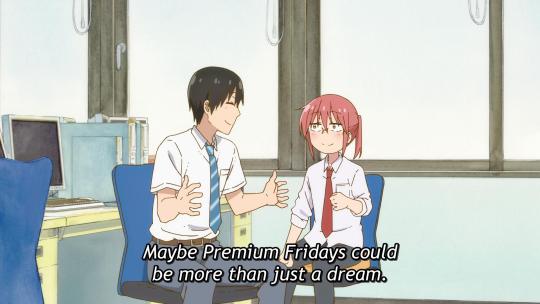
A “Premium Friday” is the last Friday of the month, where you get to leave work at 3 pm. It is largely theoretical.
The idea was created by the Japanese government as a way to reduce working hours and encourage domestic spending (boost demand), but it has not been implemented by all that many employers, and especially not many smaller employers. There isn’t, after all, any mandate or government-provided incentive for doing so.
Evidence from the places that did implement it suggests it is actually good for the economy, but good luck convincing bosses to give extra paid time off.
“Last Friday of the month” was chosen because most people get paid on the 25th each month (Japan tends to pay monthly instead of every two weeks), so it would usually be right after payday, when people are more willing to get spendy.
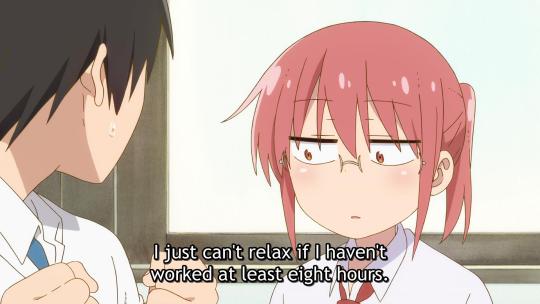
Kobayashi saying eight hours here reminded me of a “fun” fact: the typical Japanese work day is eight hours plus a one hour break. Plus a one hour break, not with. So a typical work day is actually nine hours. Most commonly 8 to 5 or 9 to 6. Not many “nine-to-fives” here.
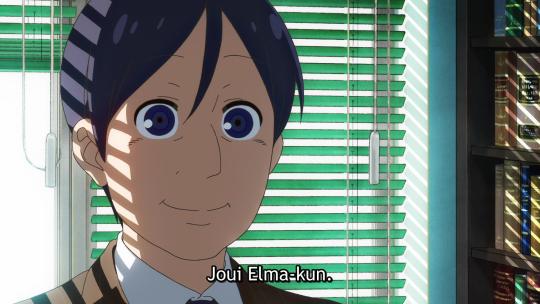
The characters for Joui are 上井, which usually read as Kamii or Uwai. It’s “Joui” because that means, when written as 上位, “superior.” As in “a superior life-form.” Like a dragon, say.
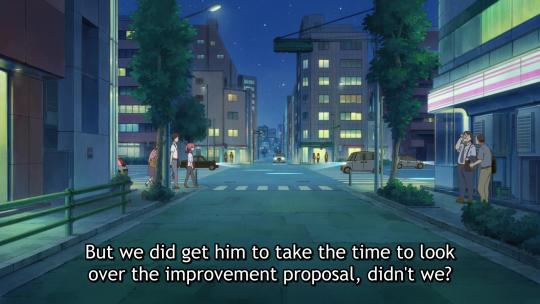
でも、ゆっくりやる事業改善案を見せてもらえたじゃない?
This one is actually kind of a critical mistake. In the English it sounds like she’s talking about the improvement proposal that Elma made and that the boss looked at. In the Japanese though, she’s talking about a different plan, one the boss showed them*, that is similar in idea but is going to take longer to be fully implemented**. So we’re being told that while Elma didn’t get what she wanted as fast as she wanted it, it is still basically going through at a slower pace.
*In ”見せてもらえた misete moraeta,” the misete vs mite means they were the ones who got shown something, rather than the ones who got someone to look at their stuff.
**Which you can tell from the ゆっくりやる yukkuri yaru, where yaru is basically “do” and yukkuri means (in this case) at an unhurried pace.
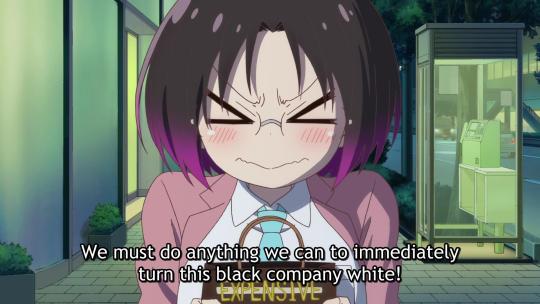
(Re previous note: Hence why she says “immediately” here.)
“Black (ブラック)” and “white (ホワイト)” in the context of Japanese employers refers to how well employees are treated: a company with good benefits/pay, reasonable levels of overtime, and feels safe to work at is “white,” while a company that has excessive overtime, often pays poorly, breaks labor laws, and allows harassment to fester is “black.”
While “white company” was created simply in contrast to the term “black company,” the latter finds its origins in front businesses for organized crime, which were called “black” in the sense of “illegal” (similar to “black market” or something being in a “grey area”). Given the international reputation of Japanese work life, you can imagine that “black company” as a term sees much more use.
There’s been some discussion about maybe replacing it due to the racial implications (especially since it uses the English word “black”), but while typically English translations drop the color for that reason (e.g. ブラック企業大賞, an “award” given to Japan’s worst employer each year, is officially “Most Evil Corporation of the Year Award” in English), it hasn’t really penetrated to the mainstream at this point.
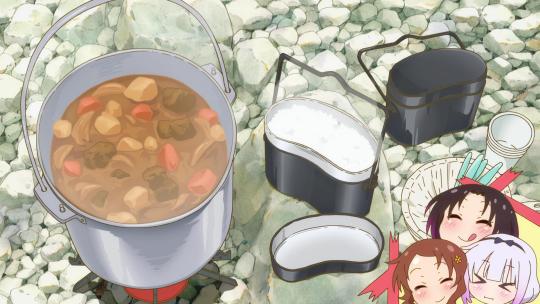
The rice there is in a 飯盒 hangou, a metal container that looks… like that, and is the stereotypical item of choice for cooking rice while camping. It has its origins in the mess kits used by the military, but these days they’re primarily marketed as portable rice cookers for camping use.
You can get round ones too, but the bean shape is very popular.
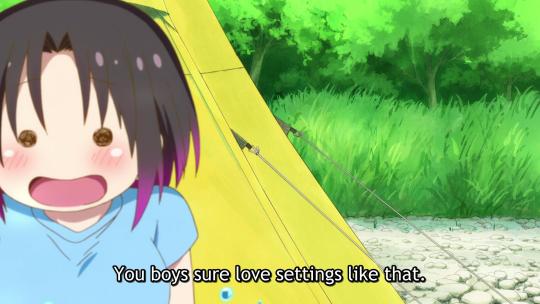
“Settings” here is 設定 settei, lit. exactly that, “setting(s).” E.g. if you open a computer program and look at the settings menu, it’ll be settei in the Japanese language settings (settei).
I bring it up here because there’s a bit of a difference in how it gets used colloquially like this. In English, the “setting” for a story typically refers to where and when it’s set. In Japanese, “setting” in that sense is usually 舞台 butai. But settei is still used when talking about fiction, just in a different, more expansive way.
Often in these cases settei is used to refer to the various conceits that provide the context in which the story takes place. In this show, for example, one such “setting” is that dragons are real: another is that magic exists. It comes up especially often in fantasy/sci-fi type stuff where there are major distinctions between that universe and the real world—not that stories in a real-world setting don’t have settei of their own, but they often are lumped into descriptions of the plot in that case (”a dragon comes to live with an office worker in her apartment”).
It also refers to the “settings” of characters, like name or age, and things like “they run a bakery that’s going out of business and are trying to save it.” Basically all the details you’d have in a character profile.
It also gets used in conversation to refer to pretend things or (basically) lies: like here, where Saikawa thinks Shouta is playing pretend with his ley-lines talk, or e.g. if someone is trying to tell you some outlandish story (“my uncle works at Nintendo…” or someone asking for love life advice for “their friend”) and you’re just like “Okay so that’s the settei here, I see.”
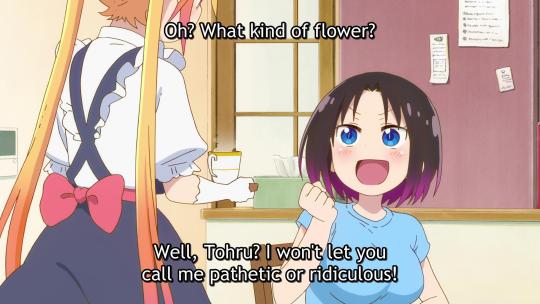
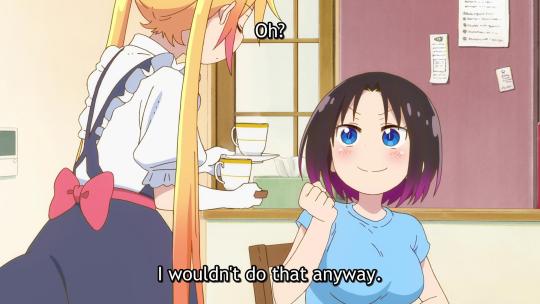
Not really a big deal, but Elma’s line here in Japanese implies she won’t let Tohru call her that anymore (see her もう mou). Tohru’s response is also more of a “I haven’t been?”, since of course she wasn’t aware of Elma’s-mental-image-Tohru tormenting Elma in the previous scene:
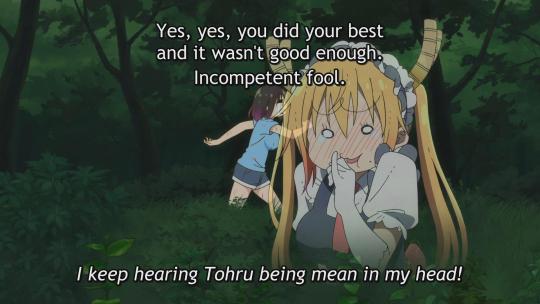
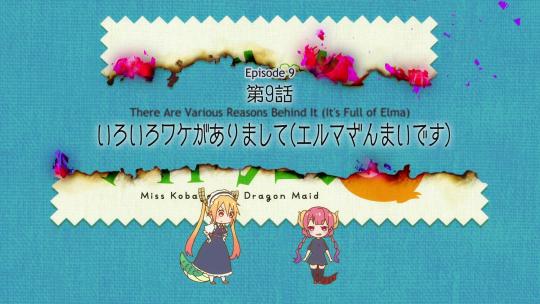
The word for “full of” in the title here is ざんまい zanmai (a suffix form of 三昧 sanmai), usually meaning that there’s a whole lot of [whatever] to immerse oneself in. I mostly bring it up because there’s a famous restaurant chain called Sushi Zanmai that specializes in, obviously, sushi.
And you know, Elma is a water dragon that looks kinda like an eel… I’m just sayin’…
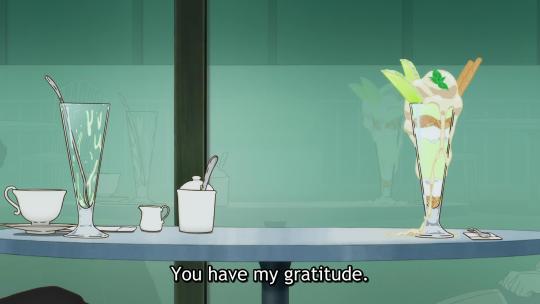
Not really a translation note, but wild that Elma didn’t even touch her parfait. (Not so wild that Fafnir finished his so quickly.) Serious business ahead...
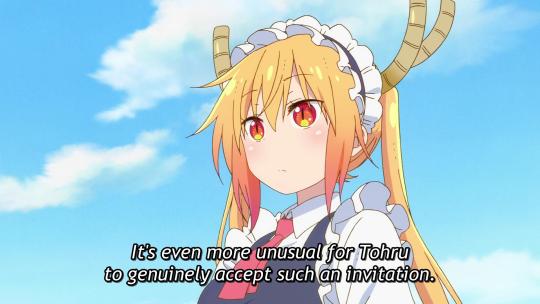
“Genuinely” here is 素直に sunao ni, where the “ni” is used like “-ly” to make sunao work as an adverb. Sunao itself is an interesting word that falls into that category of “simple concept that is often hellish to translate.”
For some context, the first character, 素, is also used in the word 素顔 sugao, which is a face without makeup and 素材 sozai, basically raw ingredients/materials. The second, 直, is used in words like 直線 chokusen, a straight line, or 正直 shoujiki, honest.
Put them together, and you’ve got a word with connotations of directness and being unadorned. The original definition of the word tends toward “simple, natural” in the sense of e.g. life growing up on a rural farm.
The more common use for it these days is to describe people and their actions. Positively, it can mean something similar to a person being happy to help, or kind of like the opposite of conniving; open, frank, genuine. Less positively, it can mean someone is too trusting and easy to trick into doing things OR someone who is “too honest” and says hurtful things.
(If it helps: tsundere characters are often described as explicitly not sunao.)
In this case, the idea is that Tohru accepted the invitation easily as-is, without putting any conditions on it, or doing any “ugh, what a pain, do I have to, jeez” rigamarole—she just accepted. Another way you could put it in this case might be “It’s even more unusual for Tohru to accept an invitation like this without a fuss.”
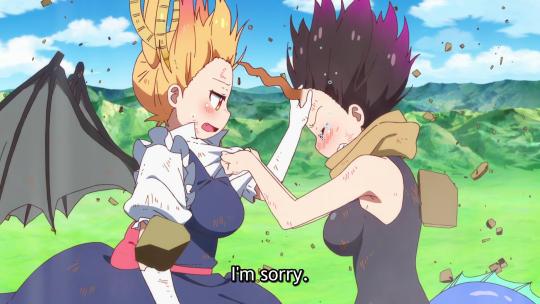
Just to point out the hand on head thing again.
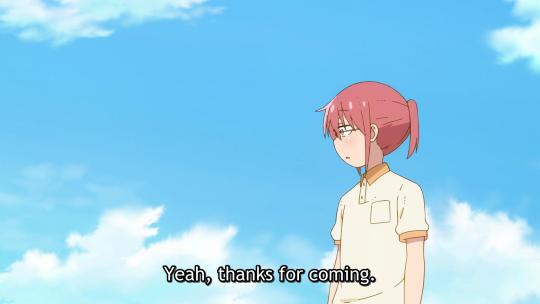
Also just to point out that this is another example of otsukare, as a reminder of how ubiquitous that word is.
And it makes a good place to end on: thanks for reading!
44 notes
·
View notes
Text
Kobayashi’s Maid Dragon S2 Episode 5 Notes
Better late than never! Hopefully I’ll catch up with these before next week’s episode hits.


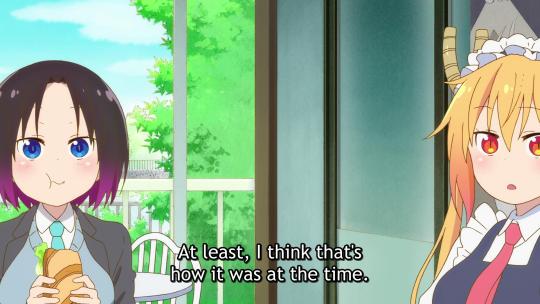
私は、種族全体の目的よりも自分がやりたいことをやっているエルマに、興味がありました。
当時の私、そんな感じでしたし。
What Tohru is saying in these shots is a little different in the Japanese:
“I had an interest in Elma, who was doing what she wanted to do instead of advancing the goals of the species [her faction]. Since that’s how I was at the time, too.”
That is, for the first sentence, Tohru is saying Elma wasn’t interested in the broader dragon goals, not Tohru herself.
Then in the second sentence, instead of a wishy washy “I think that’s how it was?” Tohru says that she was like that too, hence her interest.
So it goes from like:
“I was interested more in Elma than in faction goals, because she was acting freely. I think, anyway.”
to more of a:
“I was interested in Elma because she was acting freely, not bound by faction goals. That’s what I was like too, after all.”
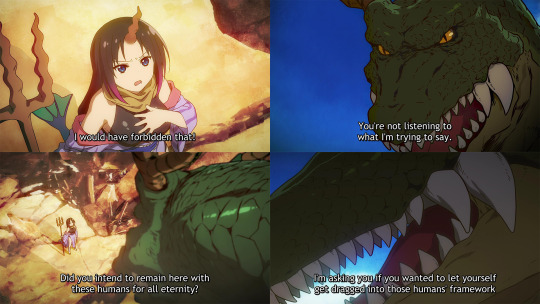
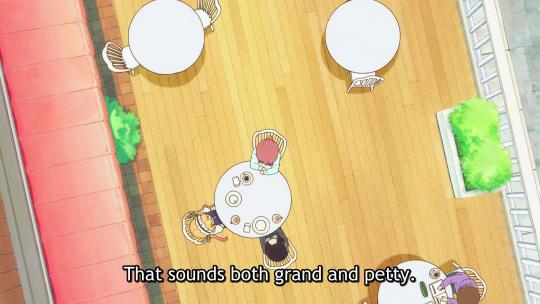
Not sure if it really counts as a translation note, but since I had some questions about it, here’s a few words on the Tohru/Elma disagreement scene.
Tohru thought Elma was like herself: acting not according to what dragon (or human) society asked of them, but according to their own personal set of values. Elma, by allowing herself to be placed in the position of “god” by the humans, had changed that; she locked herself into permanently being a (large, important) cog in the human society. From Tohru’s perspective, she’d lost the one person she felt kindred with, her fellow “free actor.” She doesn’t particularly care what happens to the humans, hence the 私が言いたいことはそういう話ではない (“That’s not what I’m trying to talk about”) when Elma says she’ll just stop the wars from happening: that’s all well and good, but it doesn’t solve Tohru’s issue.
Hence Kobayashi’s response: both grand (involved the fate of nations), and petty (Elma got “trapped” by food, and Tohru’s initiation of the fight was for personal reasons).

喧嘩するほど仲がいい kenka suru hodo, naka ga ii
This is one of those sayings that is often a giant pain in the butt to translate, because it’s not an odd concept in English, but for whatever reason* there is no common pithy saying for it like there is in Japanese, so it’ll almost come off less smoothly.
The idea is that, in order to “have a fight” with someone, you have to already have an established relationship that’s at a certain level of closeness.
Two strangers? Why would you even have a reason to fight, who cares. Two acquaintances? Why deal with it, just smile and nod and go on with your day. Two close friends though? You probably care enough to want to convince them of whatever it is, and/or you don’t want to have to hide your real thoughts/feelings around them like you might around, say, just random coworkers or something—meaning more chances for friction.
*My theory on this is that it comes from the same place as the “wow Japanese people are so polite” stereotype and stuff like honne/tatemae as discussed in a previous episode’s notes: in a situation where two strangers/acquaintances might get into a shouting match in the US, in Japan there’s a comparatively higher chance they just tatemae it up to prevent direct conflict and end the situation early—hence less likely to “have a fight” per se. As always this stuff is just on a continuum though.

What do you call these “clouds” left by planes as they fly? In Japanese, they’re called 飛行機雲 hikoukigumo, lit. “airplane clouds.” And they’re not a season word!
Officially, anyway.
However, they are heavily associated with summer, to the point where you if you google around to find out if they are a haiku season word, there are a whole bunch of sites to tell you no, they’re not, stop asking. That doesn’t mean they’re not a great way to tell the audience it’s summer anyway, though!
If you’re curious as to why the summer association: how long vapor trails like this remain visible depends heavily on how humid the air is. More humidity, longer trails. And Japan has very humid summers (and very dry winters!).
If you’ve heard the song Tori no Uta, the OP to Air (also animated by Kyoani), hikoukigumo is the very second word in the lyrics—no coincidence given the heavy summer theming! If you haven’t heard it, I suggest giving it a try.
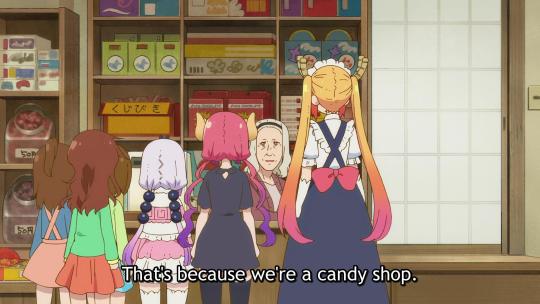
“Candy shop” here is 駄菓子屋 dagashi-ya, which is a kind of store that specializes in very cheap varieties of “candy” (maybe more accurately snack foods?): dagashi. If you’re seen/read any of the series Dagashi Kashi, you’re familiar with this variety of snack.
Dagashi is so called because, back in the Edo period, quality white sugar was super expensive and not something commoners could typically eat. Cheaper brown sugar was, though, so you ended up with different terms for stuff made from each: the expensive 上菓子 jougashi and the cheap 駄菓子 dagashi.
Later, in the Showa period after WW2 when the average person was able to afford a bit more, the term stuck around but more generalized, referring to a wide variety of cheap snacks. These snacks are not necessarily always sugary, and they often have some sort of gimmick so it wasn’t “just” a piece of candy—toys attached, or games/puzzles, or requiring some interesting way to eat/drink them. If you grew up with Dunkaroos: that kinda thing.
Similar to “penny candy,” dagashi was/is cheap enough for children to afford several different varieties of with just a bit of change from their parents, and small stores specializing in them—dagashi-ya—sprung up all over the country, quickly becoming a popular spot for kids… and, not too long after, a symbol of childhood nostalgia.
They’ve been on a big downtrend in the last few decades however. The spread of convenience stores as a competitor for snack buying is often cited as one reason, while a greater variety of ways for kids to spend their playtime now (video games etc.) is another.
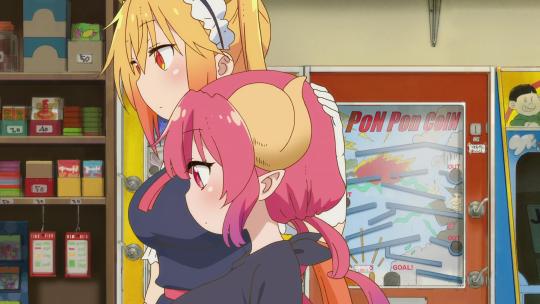

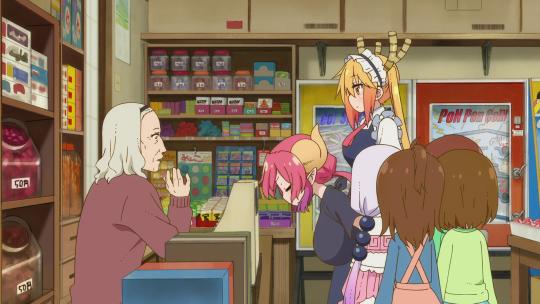
You’re probably aware, but of the many reasons to bow in Japan, to show humility when making a request is a big one.
Of note here is that Tohru doesn’t push Ilulu’s head down, which other characters in other shows might have done here, but just lightly reminds her: yeah okay you’re a dragon talking to a human, but you’re the one asking—act like it. She does, and her sincerity is rewarded.
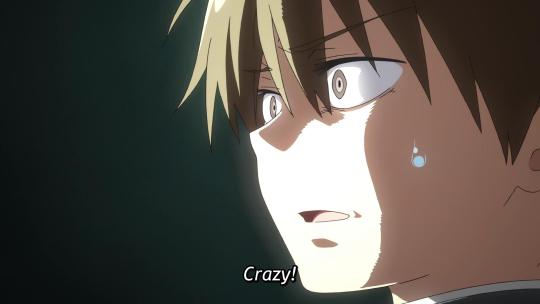
The word here is ぱねぇ panee, which is a heavily abbreviated form of 半端(では/じゃ)ない hanpa nai, ~lit. “not halfway/half-done/half-assed.”
hanpa ja nai→hanpa nai→hanpa nee→panee
It’s used probably how you’d expect: describing something intense af.
(I’m mostly just bringing it up because I love super-shortened slang like this!)


The phrase for “like” here is 気に入った ki ni itta, which is basically to have an interest in something/someone, to take a liking to, to say something is a favorite, etc. When said of another person, there’s typically an air of the speaker considering themselves in a higher position. It generally isn’t “like” in a romantic sense.
Take’s “hey that’s my line,” comes from the fact he’s (in his mind) in the position of power and was judging her on whether he’d try to kick her out of the job. You can tell he was thinking of it as “I like the cut of your jib. I guess you can stay.” kind of thing.
Normally a new employee would not say this about their new boss/job, even if they did like it, though a boss/senpai could of a new employee, hence the “what?”

Notably, Ilulu used “like” earlier in the episode to refer to Tohru as well. In that case it was 好き suki, which is a more literal “like,” with the various implications that may or may not have. Personally, it strikes me as a little odd to translate them both as “like” in the same episode.
And that’s it for episode five! I’m

14 notes
·
View notes
Text
Kobayashi’s Maid Dragon S2 Episode 4 Notes
This week’s episode notes are a little short due to me being super busy. (Maybe shorter is better on these things anyway though?)


This does get explained somewhat, later in the episode, but here’s some more. Takiya is calling Kobayashi a 柱 hashira, lit. “pillar,” meaning what you’d probably expect: she’s a metaphorical “pillar” holding up/supporting the company.
The word is also used in the term 人柱 hitobashira, lit. “human pillar,” which refers to actual human sacrifices. The specific origin comes from people who were prematurely buried/drowned as sacrifices in the building of things like castles or other major construction efforts.
The meaning of 柱 here, though, is not the same as “pillar” per se: “hashira” is also a “counter” word used to refer to gods (so instead of saying “二人, two people, you’d say 二柱, two gods”). The idea was that the sacrifice became sort of deified and would strengthen/protect the building. This isn’t exactly the same practice as offering human sacrifices to gods (or dragons) for things like a good crop harvest during a famine/drought/etc., but obviously it’s pretty close. In general these days, hitobashira can be used to refer to any sort of human sacrifice (including less serious uses, like someone going first in a videogame to test something for everyone else at some risk to their account, etc.)
Unrelated to Maid Dragon, but if you’re into Kimetsu/Demon Slayer: I would imagine the author was uh, not unaware of this connotation when choosing the name “pillar” in that series.
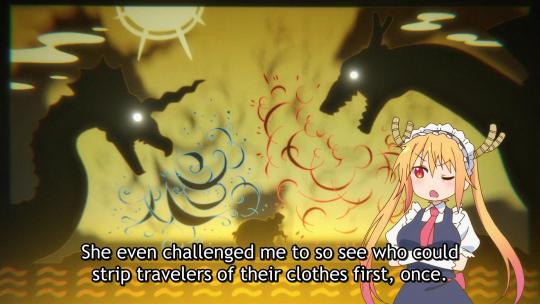
This is a pretty famous story, so you likely have heard it before, but this refers to Aesop’s fable of the North Wind and the Sun. The two entities make a bet as to which can get a traveler to remove their cloak; the North Wind tries to blow it off them, but fails as the traveler only wraps themself in it tighter, while the Sun succeeds by warming the traveler enough that the cloak becomes unnecessary.
The usual moral being that persuasion can achieve what threats and force cannot.
I’m not 100% sure if the blue/orange coloring is supposed to suggest Tohru = Sun and thus was the winner, or if the actual sun up in the top left is there to deny that and suggest neither won (because lol dragons using persuasion on a human).

And here we have an example of some people musaboru-ing some damin, if you recall that phrase from the last episode notes.


The word for gaze/resting face here is 目付き metsuki, a combination of the words for “eye(s)” and tsuku, a word with a million definitions, but for now let’s just say means “to attach.”
I like to think of it as “the way your ‘eyes’ are attached to your face,” hence the kind of look you have, but more accurately it’s the way your eyes look when you’re looking at something (i.e. the way you “attach” your eyes to something).
As you might guess, the fact that it’s specifically referring to eyes means it’s most commonly used in situations where the rest of the face is in a relatively neutral position. Given that, it may make sense that it’s one of those terms that is technically neutral, but is most commonly used together with more sorta negative-sounding adjectives. For example, 目つきが悪い (“having a nasty/scary look”) is extremely common, and is what they’re saying of Kobayashi here. 鋭い目つき (“a sharp/piercing look,” e.g. with narrowed eyes) is another main one.
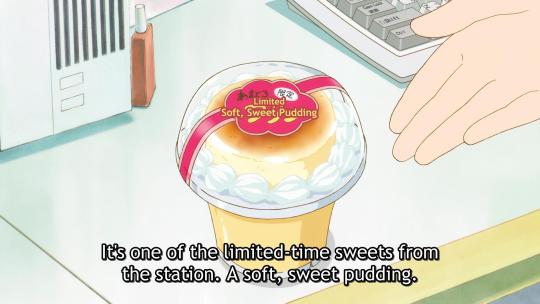
Ahh, “limited” products. Things like this are a super popular marketing technique in Japan, to the point that “日本人は限定に弱い” (“Japanese people are weak to ‘limited’ things”) is basically a meme in Japan itself. There’s endless articles you can read (if you can read Japanese) about “Why do Japanese people fall for ‘limited’ marketing schemes so much?”
I don’t know if people in Japan are actually weak to that form of marketing especially—probably not really—but it’s certainly a thing people think. Maybe it has something to do with Japan traditionally having a very high savings rate, and “limited-time” being an effective marketing tool when people are otherwise feeling frugal? Who knows.
Anyway, there’s multiple flavors of “limited,” of course. Sometimes it’s like “limited edition” runs of something, like a game. Other times it’s “seasonally limited,” like Kit-Kat flavors or restaurant menu items (check out menus during strawberry season). Yet others, it’s like how a bakery will only make 5 or 10 of a certain popular item per day, and you have to rush to try to buy one before they sell out.
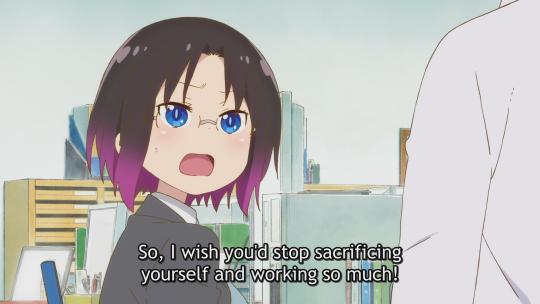

Continuing from the earlier hitobashira note.
Kobayashi says this, that there are no hitobashira in modern Japan, but anyone who has heard the term 過労死 karoshi, death by overwork, knows that’s not exactly true.
(It’s worth noting that since the widespread popularization of the term karoshi, there have been a number of reforms toward reducing working hours. To some extent they’ve been successful, but not that successful; much of the reduction in official working hours data comes from the spread of precarious temporary employment contracts that have people working fewer hours for fewer benefits, while typical salaried employees keep working long hours. Similar to the problem in the US I think, actually.)
So why does Kobayashi say this? Well, we’ll see if they touch on this issue again later in the season (there’s reason to believe they might), but for now it may be that it’s representing Kobayashi’s view—rather than the show’s—as one of those people who works way too much, but has unfortunately come to accept it as normal.
The typical word for people like that is 社蓄 shachiku, a play on the word for “domesticated farm animal” (家畜 kachiku)—a “domesticated society animal” you might say—that refers to people who work long, hard hours (typically for not enough pay), but also have no will to try to improve that situation (and may not even consider it a bad thing).
It’s a very glaring gap (even looking at the Japanese comments for this scene on niconico, there was a wave of “uhhhh wrong”), so I have a feeling it will come up again. But who knows!
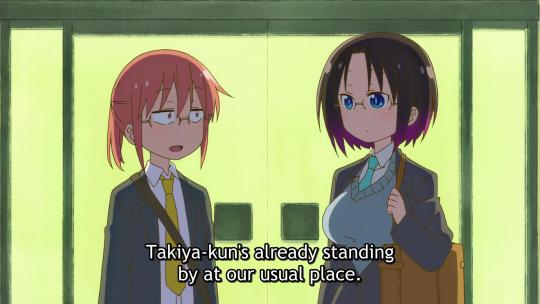
Just because I love this word so much:
The word Kobayashi uses here for “standing by” is the verb スタンバる sutanbaru. It literally comes from the word “standby” in English, but “verbed” by replacing the final sound with the Japanese verb ending -ru (which can then be conjugated, as in this line). So:
Standby→Standbai→Stanbaru
Beautiful.


Collab cafes are, as is perhaps obvious, themed restaurants set up in collaboration with some media franchise. They’ll have stuff like character-themed menu items, merch, and often randomized-art drink coasters, as we see here. Gotta keep buying drinks til you get the one you want/all of em! (or trade with other people, that’s big too)
Typically these collabs are short-lived, capitalizing on the popularity of something when it’s at a peak (such as during/after an anime run), though some major franchises have permanent ones, like the Gundam Cafe in Akihabara.
Maid Dragon itself ran one itself last month (July 2021) with Sweets Paradise, a popular cake buffet chain (yes, a restaurant based around all-you-can-eat cake). Here’s the menu from it:
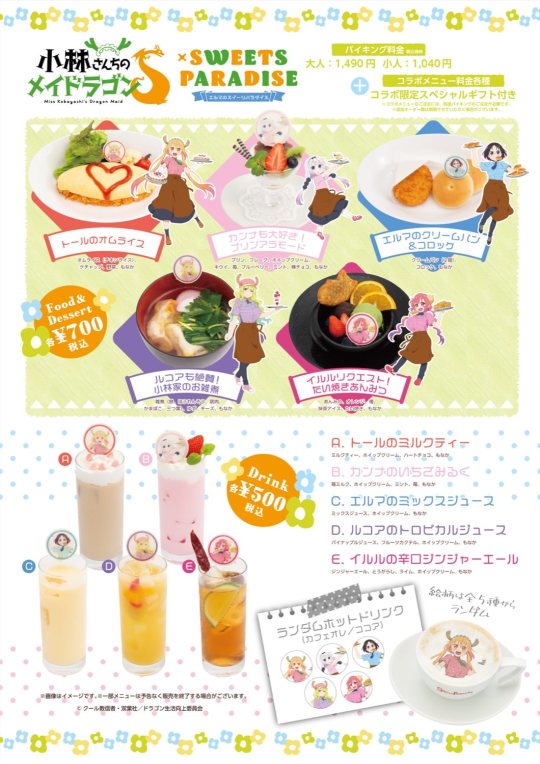
Also note that the maid in that scene is voiced by Georgie’s VA.

Just as a little note, the word for “casual clothes” here is 私服 shifuku, made of the characters for “personal/private/me” and “clothes.” Shifuku are basically casual clothes, but they’re more specifically in contrast to uniforms, than formal/casual per se.
Sort of the idea is that, unlike a uniform, it’s something that you (or a parent/partner perhaps) picked out for yourself, and thus is more personalized. A lot of romance-focused shows, especially ones set in a middle/high school or a workplace, will have scenes where the characters first get to see each other's “personal clothes” and ooh/aah about it.
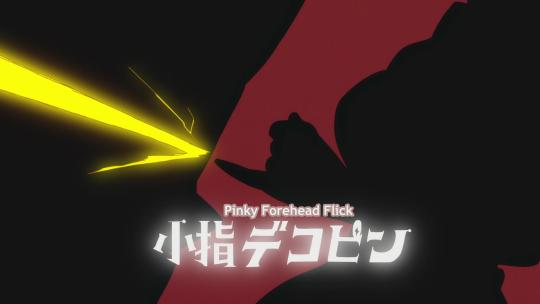
Just for clarity, yes the Japanese is also “forehead” flick, despite it not being on the forehead at all. (デコピン dekopin, where deko is forehead and pin is an onomatopoeic word)
That said there’s not really a colloquial word for “flick” that isn’t on the forehead, so it sometimes does get used for other body parts (not that that stops people from laughing about it not being “deko”pin).
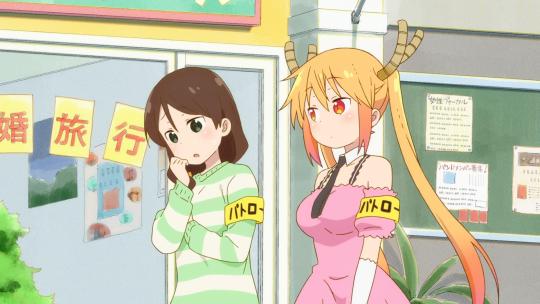
I don’t know if these background signs will ever be relevant, but just so you know what they say:
-Yellow and red: “Honeymoon (/Newly-Wed) Vacation” (presumably that storefront is a travel agency)
-Top poster on right: “Female Vocalist” (either a band looking for a woman singer, or the inverse)
-Bottom poster on right: “Band Looking for Members”
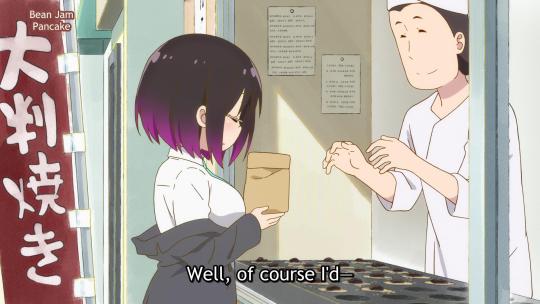
Here Elma is buying ooban-yaki, also known as Imagawayaki and a million other local names, a flour-based confection filled with red bean paste or various other flavors (this place has red bean, chocolate, custard, and green tea).
It’s similar to taiyaki, the fish-shaped version of this that shows up in a bunch of anime. The “ooban” (大判) comes from a type of (now-defunct) coin that it sort of resembles shape-wise, not unlike how “tai” is the name of the fish taiyaki are shaped like.
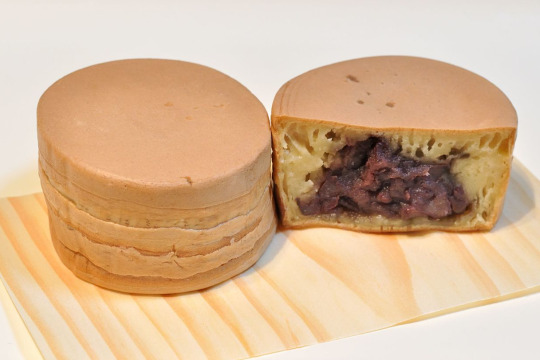

Traffic lights in Japan tend to be “green,” but are often referred to with the word that would usually be translated as blue (青 ao).
Referring to green/blue as the same color (especially in certain situations) is a common feature of many languages/cultures (there’s a big wikipedia article on it), and this is one instance of that still being the case in Japan, even as blue/green have become much more linguistically distinct over the years.
Anecdotally, I’ve heard stories from several Japanese people that moved to the US for a while, about how they didn’t know about this and called the “go” traffic light “blue” in English, confusing the heck outta the locals.
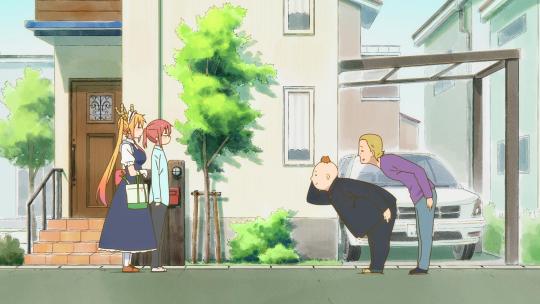
When these two dudes greet Tohru, they use ちーっす chiissu, which is an interesting term. It comes from konnichiwa, the famous 'during the day’ greeting, shortened all the way down to just “chii.”
Konnichiwa→Konchiwa→Chiwa→Chii
Then the “ssu” is added, which is probably (though as a super slangy term, nobody is really 100% sure) short for です desu, you know the one, which gives it a minimal level of “politeness,” such that it is able to be used toward people of a higher standing than you while still being very slangy and highly informal.

This is the various pieces to the character for “bear,” 熊, in the order you would write them if writing it out by hand properly.
The scene after this, with the delinquent Ryuu training in the mountains and the bear attacking, seems to be a callback to episode 5 of last season:


For this episode title, the saying used is 郷にいては郷に従え gou ni ireba gou ni shitagae, which means pretty much exactly what the English “When in Rome, do as the Romans do” does.
I mostly bring it up here because the one difference between the two is that the gou basically just means a village, so there is not a specific reference to a real-life place like Rome. It makes no difference in this case, but English has a tendency for it’s sayings to do this sort of thing, and it makes translating stuff in a fantasy setting annoying sometimes! Yes I’m venting!

I guess “Acro” for “acrobat” since it’s the Parkour Land mascot?

Part of this line is 大人のずぃかん otona no zikan, which is supposed to be 大人の時間 otona no jikan, “adults’ time.” The difference is that the “じ ji” is pronounced “ずぃ zi/zui.”
Why? Well, Japanese doesn’t actually have a “zi” sound; when the consonant for “z” combines with the vowel “i,” it changes to a “j” sound instead. Obviously this isn’t a problem when speaking Japanese, but it can be a bit of a stumbling block when trying to pronounce English (or other language) words that have that sound in them.
The workaround, when trying to imply a more “correct” pronunciation for such foreign words, is write the sound not as “ジ” (zi/ji) but “ズィ” (”zu” plus a small “i”)―which is what Tohru is pronouncing here.
The reason she’s doing that? Speaking a foreign language comes off as fancy and mature, so she’s playing up the “adult time” bit. It’s not super unlike someone speaking English mixing in a little French, or a French accent, to jokingly make something seem more romantic. “After you, mademoiselle!” or something like that.

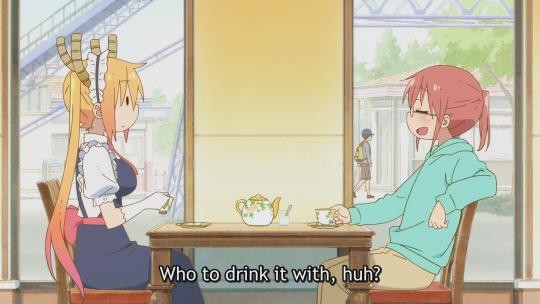

味は普通だ。
誰と飲むか、だよね。
それは私とだからですよね…
The second line here is a variation of a saying, one that basically goes “it’s not what you drink that’s important, it’s who you drink it with.” I.e., even the best tasting food or drink will be bad if had with people you hate, and even bad-tasting stuff will be a good time if had with the right people.
So in this case, the idea is that the tea is very average, but Kobayashi is having a great experience anyway. Tohru hopes it’s because she’s with her, but is worried that it’s actually because of the Victorian-style maids.
So maybe something along these↓ lines?
“The taste is just average. But what’s important is who you drink it with.”
“You do mean me by that... right?”
~Fin~
26 notes
·
View notes
Text
Kobayashi’s Maid Dragon S2 Episode 3 Notes

Sparrows! Specifically the Eurasian tree sparrow, known in Japan as the suzume. You can just about see them all over Japan, all year long—but that doesn’t mean they aren’t a season word!
Depending on their depiction, they can be used as a season word for most times of the year, but a major one is “late spring,” as that’s when they’re out and about finding food for their baby birds. You can also see in the art they look a little floofy, indicative of the winter coat they haven’t fully shed yet; suzume in summer have a more sleek look. Here’s a shot of them from late summer last season:
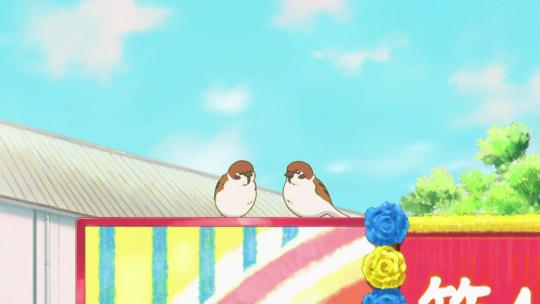
And from closer to winter here↓. Quite fluffy.

As a quick refresher, 季語 kigo, or season words, are words/phrases/concepts used to give a sense of season to a haiku (or other poem/work of art), which is what part of what differentiates them from a senryuu. They were used pretty frequently in a lot of episodes last season, but a bit less so this time so far.


Where Lucoa and Ilulu are talking about a “right” here, the Japanese word is 資格 shikaku. While this usage is similar to “right” in English, the connotation is a little different as the word actually means more “qualification.”
Whereas a “right” is generally something you have innately in some sense (e.g. if you make art you automatically have copyright over it, you have human rights just for being human, etc.), a shikaku is something you earn (e.g. if you study and take a test for certification program and pass, you’re rewarded with a shikaku.)
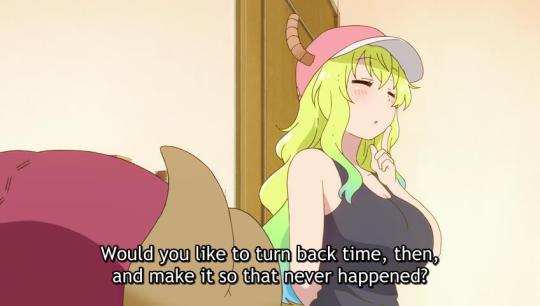
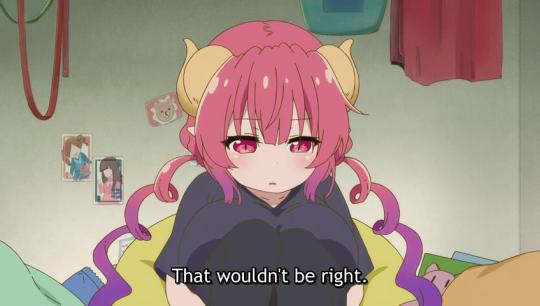
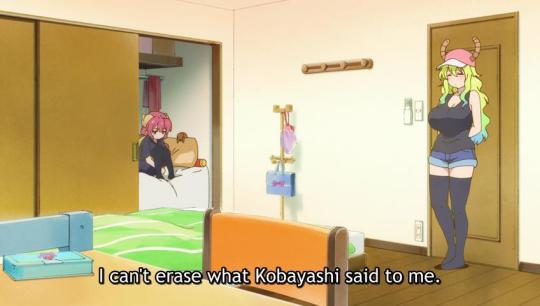
Ilulu’s response to the question here is
そういうのは違う。小林がくれたあの言葉はなかったことにはできないから。
One way in which this differs from the English is that she’s not saying it would be right or wrong, but rather not the solution she’s looking for—because it would also mean undoing the words Kobayashi gave her, and that is something she doesn’t want to do, no matter what.
In contrast the English feels more like she thinks it would be wrong to do that, and even if she did it wouldn’t let her escape what Kobayashi said to her. (That would make more sense if Kobayashi had called her out on being evil, but that’s not really what went down.) An alternative wording might be something like:
“That wouldn’t solve anything. Besides, I don’t want to erase what Kobayashi gave me.”
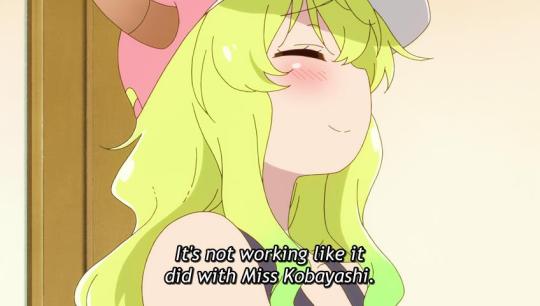
This line is: 小林さんのようにはいかないなー
This is perhaps just my interpretation, but the English here sounds like Lucoa once convinced/helped Kobayashi in some fashion previously, is trying it again with Ilulu, but failing this time. (I don’t that’s ever happened though.)
In contrast, I think the Japanese is saying that Lucoa is trying to be like Kobayashi (e.g. when helping alleviate/solve Tohru’s various worries), and it’s not really working for her. I.e. “It’s not working like when Miss Kobayashi does it.”
Ilulu’s line about “I don’t want to ask Kobayashi about it because she’d probably solve it too easily" seems to support that reading; the dragons know Kobayashi as worries-solver.


The English here has Lucoa saying she’ll go talk to Kanna/Saikawa, and casually telling Ilulu to wait in the bathroom. But Lucoa doesn’t actually talk to the kids, and even if she was planning to, why would Ilulu waiting in the toilet do anything?
The answer is that Lucoa is actually telling Ilulu to talk (to an unspecified subject, assumed to be Saikawa, since she’s a human and thus someone Ilulu feels guilty about interacting with; Kanna she’s more fine with, as a dragon). And instead of “Go ahead and wait in the bathroom,” it’s more of a “Go wait in the bathroom and see what happens,” with the implication Lucoa is going to set something up.
And she does!

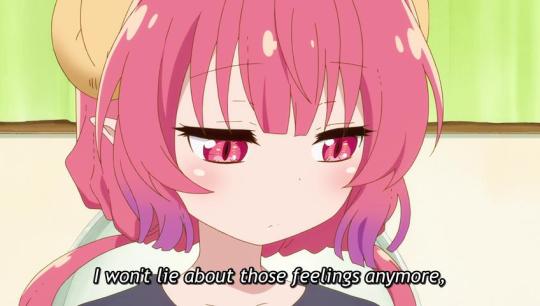

“I won’t lie about X, but Y is a different story.” This seems to imply she will still lie about Y? That seems a bit odd to me, especially when she just lied about X (those feelings) to Kanna/Saikawa minutes ago.
The Japanese says something a bit different though.
The core of the middle line here is 気持ちに嘘をつかない kimochi ni uso wo tsukanai. Because the に, the particle indicating “direction,” is attached unadorned to "feelings,” it is saying not “lying about X” but “lying to X.” This construction, to say one is lying to a feeling, is fairly common in Japanese media. It’s basically equivalent in English to lying to yourself about those feelings.
(for “lying about X” you’d change the に into a について or similar)
So basically she’s saying she won’t pretend, to herself at least, that she doesn’t want to play. But that’s a separate issue to whether she has, as she said before, the “right” to play after what she did.
You could maybe put it sort of like this:
“I won’t lie to myself about my feelings anymore. But that doesn’t mean I can act on them after what I did.”

I feel extremely silly even pointing this out, but the beam here is 尿意 nyoui, which is the urge to pee, not necessarily actually needing to pee. Hence why she seems to stop needing to as soon as she gets to the bathroom and walks straight back to the living room with Ilulu after they talk.

“Be deceived” here is not 騙される damasareru, lit. “be deceived,” but 騙し討ちにあう damashi-uchi ni au, which is like being hit by a sneak attack, being stabbed in the back, etc. In a fairly literal sense in this case too, as they’re talking about actual combat.
I mostly bring it up because it feels like there is not much difference between “being deceived” and “being tricked,” despite those being portrayed as polar opposites (deceived by hostile dragons, tricked by kind Kobayashi), so it might have been wise to differentiate them more in the translation.
E.g. perhaps “She had to change to avoid a knife in the back.” (though dragons don’t use knives, so maybe a claw?)
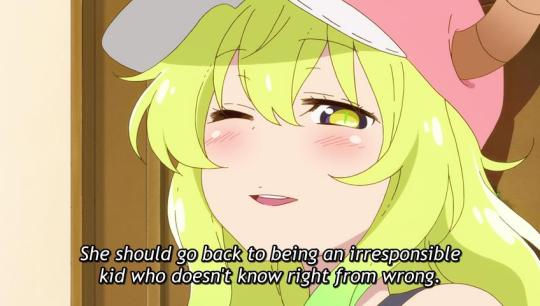
Another pretty minor point, but the “doesn’t know right from wrong” is 分別のない funbetsu no nai, where funbetsu means not so much “knowing right from wrong,” but a more encompassing sense of discretion and maturity.
I mostly bring this one up because it struck as me awkward to say Ilulu explicitly shouldn’t know right from wrong, since that would be going backward to her be okay destroying the city again. Instead it’s more that she shouldn’t need to feel weighed down by what’s “correct” or what she “should” do. One possible alt example:
“So go back to being a kid, and worry more about what you want to do than ought to do.”
(Lucoa also changes from a narrative tone to a more conversational tone at the end, in conjunction with the visual shift away from the flashback, so swapping the “she” to “you” might be appropriate.)

Note how Kanna shuffles the cards here. Depending on where you’re from, this may seem like an odd way of doing it (unless you watched Yugioh maybe). A lot of places with majority English speakers tend to use the overhand shuffle or riffle shuffle, but in Japan (and many other Asian countries) the most common shuffle is the one on display here, known as the Hindu shuffle.
~The More You Know~
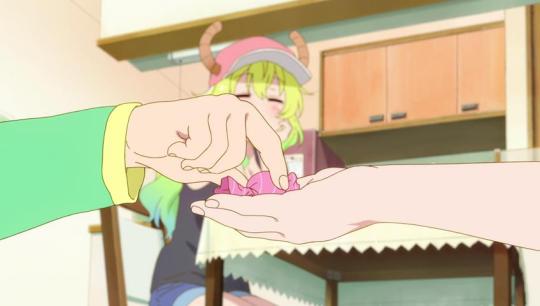
The act of handing over a piece of candy like this has been used as imagery in other places in the show as well, though I’ll leave thinking about what it represents to you.


“Blanket” is futon, which is used to refer to both the “mattress” part and “blanket” part of a full futon, the traditional Japanese bedding (not the same thing as the sofa/couch mattress you might hear called a futon in some places).
I mostly mention because just “a blanket” kind of sounds like they’re going to leave them on the floor, but they’re actually going to get the equivalent of a guest mattress (+blanket) to put them to sleep in, as it’s late enough for this to turn into a sleepover.
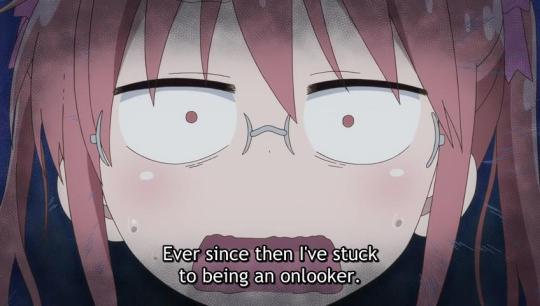
Just as a bit of trivia, the word she uses for “onlooker” here is the same term as the “spectator faction.” In the manga Tohru interjects with “Aww, come on, why not Chaos faction instead?”
Also as a side note to this whole bit about Kobayashi wearing a maid outfit; recall this scene from early in season one, where Tohru found an outfit Kobayashi had bought and stuffed deep in a closet:
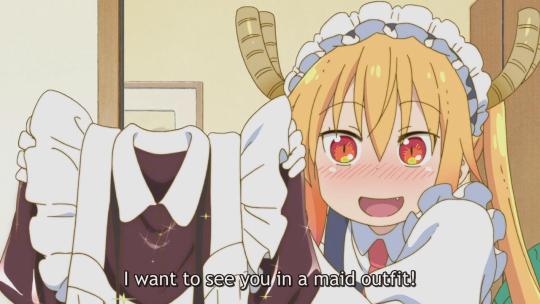
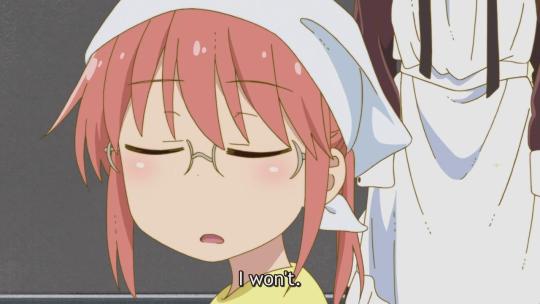
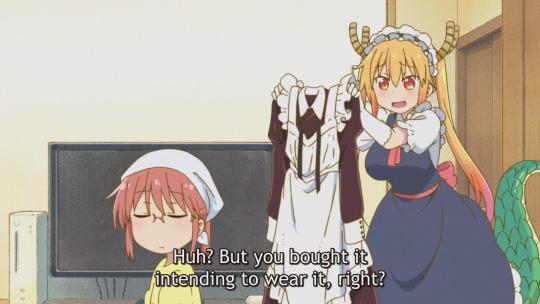
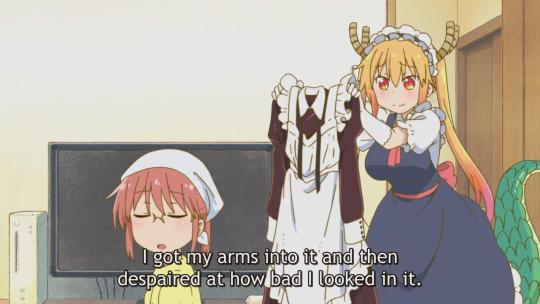
Relevant! Anyway, back to the actual episode now:


If you felt like this exchange felt a little disjointed, especially given Tohru’s tone of voice: the idea is that Lucoa is saying Tohru really goes to extremes when it comes to matters relating to Kobayashi, which is implying that it seems excessive to call so many people over for a relatively mild issue (not that she necessarily minds though). Tohru’s response is a slightly defensive “yeah I know, but thanks for coming over anyway.”
(They’re saying it in ways such that you have to read between the lines a bit though, so it may not come across as easily in a translation.)
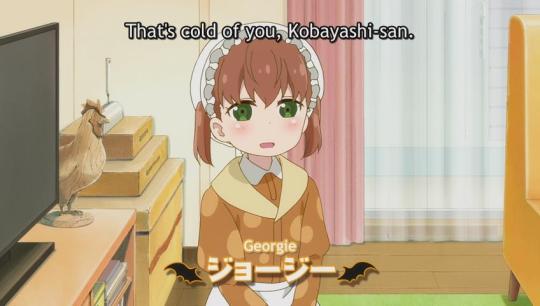
The word for “cold” here is 水くさい mizu-kusai, basically meaning “watered down” (like beer etc.), and used frequently to refer to a person/actions/words that the speaker considers too reserved for the relationship they have with the other person.
So it’s similar to cold, but cold in the context of already warm relationship. If talking about a stranger or someone you don’t get along with normally, you shouldn’t use 水くさい; you can just say 冷たい tsumetai (lit. “cold”) or similar.
In this context you could probably have her say “No need to apologize, Kobayashi-san.”
Also I like how they swap around the honorifics (Miss, Lady, -san, -sama, etc.) based on the speaker (I think differentiating between dragons and native-Japanese-speaking humans?). I would say it works given the setting, but that’s just me.
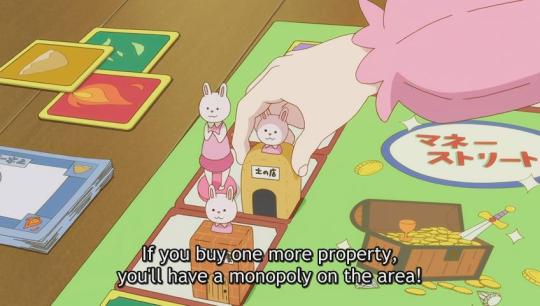
The text there says “Money Street.” It’s probably obvious, but it’s based primarily on Monopoly, which is semi-popular in Japan (though not to the extent as say in the US).
Just some trivia, but the “sales pitch” for the game in the Japanese market is more that it’s an educational game that teaches investing and negotiation skills. (The origin of the game in general being an educational tool about exploitation of tenants by landlords, so not quite the same thing.)
Japan also has Momotarou Dentetsu (”Momotetsu”), which is a video game series that’s been around since the NES and is broadly similar to Monopoly rules-wise.
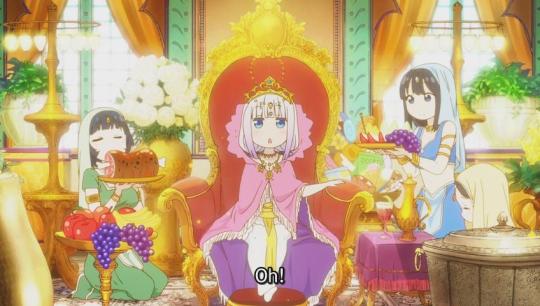
I just want to point out, amid all the riches, the bag of potato chips and other junk food in the back there.

Mini-trivia: the cardboard boxes in the background there seem to be a mix of the Amazon logo and the Seino Transportation logo, a Japanese shipping company with a kangaroo logo.
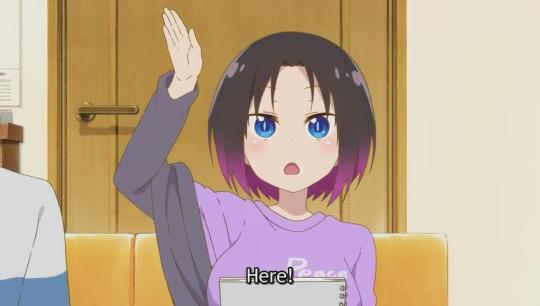
You probably noticed it without me pointing it out, but I enjoyed the fact Elma got corn starch* all around her mouth from the daifuku and then immediately got told to go play with the kids while the adults are talking.
*It may seem like powdered sugar if you’re used to donut holes, but daifuku, like most Japanese sweets (wagashi) generally, is not heavily sugared and not even particularly sweet by the standard of most “sweets” (which is part of the appeal for many). The skin of the daifuku is powdered with corn starch or similar simply to make it less sticky.

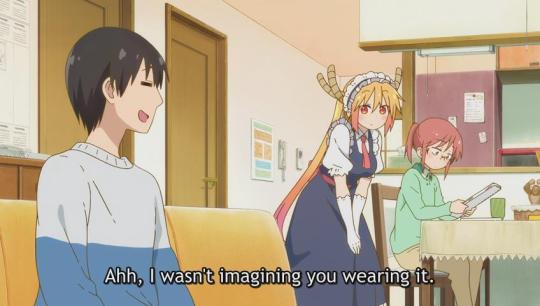

Kobayashi’s “do that” here is やろー yarou, which can mean “let’s do X” (which is a construction often used to tell/suggest someone to do something, without really including yourself in the “us”).
However in this case—especially given Kobayashi’s pronunciation and tone of voice—I think it’s actually a homophone of that, a form of 野郎 yarou, a word for “guy” with often negative connotations, like saying “son of a” or “asshole” etc.
The idea, I think, being that his immediate agreement of “Oooh, right I didn’t think about you wearing it,” comes with a heavy implication of “yeah you’re right, you couldn’t pull off something cute like that,” so she’s replying with a (mostly good-natured) “oh you fucker.”

This giant 完 kan means “the end,” used like “fin” at the end of a story or game etc. It’s also frequently used in “fake end” jokes. E.g. a show about a sentient zombie might start with the main character getting hit by a truck and dying immediately. The end! ...Except not, and they wake up as a zombie.
So here, the original goal was “make a maid outfit for Kobayashi to wear.” Then Georgie convinces Kobayashi that anything is a maid outfit as long as you are a maid at heart, so really, she’s already wearing one! The end! ...Except not.

Here’s some extra, probably needless, context on this “annoying”: it uses the word 面倒くさい mendokusai, which is basically used to describe something as annoying, a pain, etc. When used to describe a person like this, one of the ways it can be taken is specifically that the person is really fussy about details that others wouldn’t really care about—which describes Kobayashi about maids pretty well.
So just for clarity, it’s not necessarily “I became an annoying person who is a maid otaku,” and can be more of a “within the context of my maid otaku-ness I became annoying.” Just to kind of shed some light on the extent of her self-deprecation here.

The word Kobayashi uses for “helping with the housework” is 家事手伝い kaji-tetsudai, which is a noun* that means “a housework helper”... here, basically a more bland way for a native Japanese speaker to say maid.
Hence why Tohru reacts with “Oh, don’t call me that, call me a maid!”; Kobayashi went as far as to acknowledge her clothes as a maid outfit, but not quite as far as calling her maid outright. That’s our “annoying maid otaku” doing her thing.
*It can also be verbed.

These neighborhood notices, 回覧板 kairan-ban, ~lit. circular notice, are a method used by local governing organizations to distribute information or forms etc. For example, about an upcoming neighborhood event to pick up litter.
The general idea is that one person gets the notice, reads it, signs it, then goes and passes it to the next household in line. It saves paper versus sending everyone a thing in the mail, encourages interaction between neighbors, and is more likely to be read than a flyer/email, though some people consider them a pain and they generally feel a little dated.
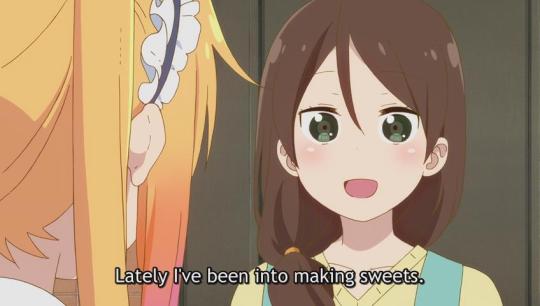
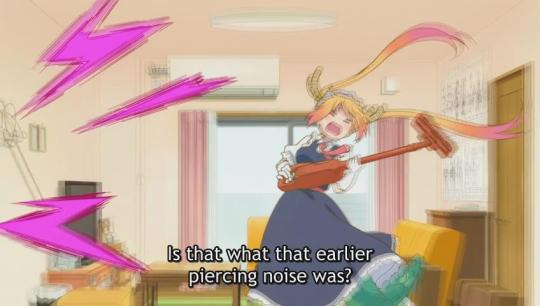

The phrase for “piercing noise” is 劈く金切り音, tsunzaku kanakiri-on, ~lit. “ear-piercing sound of tearing metal.”*
“Was it that loud?” in the Japanese is a little different, そんな音してた?, meaning “was it making a sound like that?”
I’m mostly just bringing it up to say that the “Sasakibe’s cooking isn’t just loud, the sounds don’t even make sense” gag is alive and well this season.
*The “sound of tearing metal” phrase can also used idiomatically for some types of high pitched sounds, but I imagine it was chosen very deliberately here.
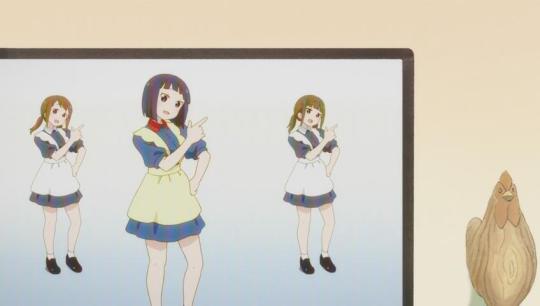
It’s probably obvious, but this is a reference to the music video of the OP for season one. You can see it on the official channel for the band, fhána, here.
The season two music video is here, and it seems to have decent English subtitles for the lyrics if you’re curious what they are.

The adjective here is ニヒル nihiru, an abbreviation of nihilistic. It can be used as actually “nihilistic” like in English, but it can also be used more colloquially to describe a person with dark vibes. It can almost be a compliment!
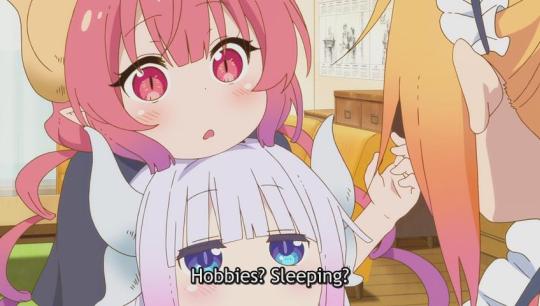
“Sleeping” here is 惰眠をむさぼる damin wo musaboru. Damin is not just sleep, but “worthless” sleep—not like a nap because you’re tired. Musaboru is a verb for ~gorging upon on something (often metaphorically, not just food).
The two words are somewhat frequently used together for, basically, lying around the house doing nothing all day. And not in a particularly flattering way, so it’s pretty funny for her to just be like “yeah I do that as a hobby I guess.”
It doesn’t mean the same thing, but it’d be like saying your hobby is loitering. Maybe could have translated as like “Hobbies? Vegetating.” or “Procrastinating?” or something, though I don’t know if those would have the right impact...


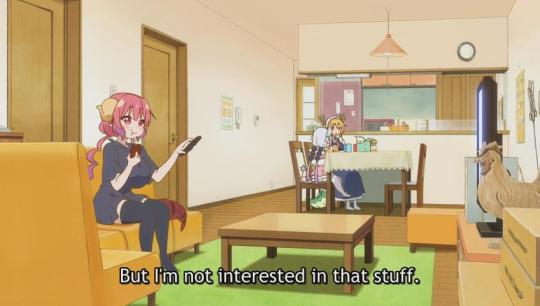
Kanna’s word for “idol” here is アイドル aidoru, i.e. idol in the pop culture sense.
Tohru’s word is 偶像 guuzou, or idol in the religious sense.
(Tohru swaps to the pop culture “idol” when she starts talking about Kobayashi though.)
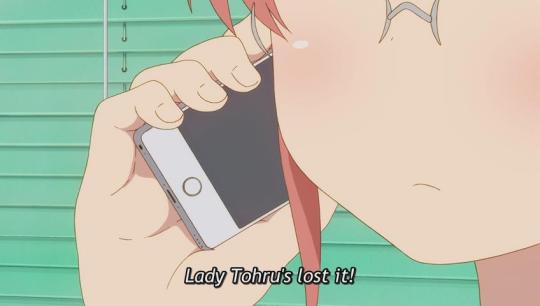

Kanna’s “lost it” it here is 大変 taihen, a pretty common, almost generic word used as an intensifier (greatly, immensely, seriously, terribly, really, etc.) in both positive and negative ways. E.g. “thanks, you really saved me!” or “that was extremely rude.”
When used alone, like here, it usually implies something bad has happened, like something has befallen Tohru and/or she’s in some sort of trouble. Hence why Kobayashi immediately rushes home worried and bursts through the door like this—and loses her tension when she sees Tohru is fine, just... extreme(ly annoying to Kanna and Ilulu).
You could maybe say e.g. “Something’s wrong with Tohru!” to keep that double meaning open.
(”Lost it!” also makes sense for Kobayashi to be worried about, but the type of worry is somewhat different in that case; “oh god what is she going to do” vs. “oh god what happened to her.”)

The “lick” here is べろ bero, an onomatopoeia for licking that’s also used as slang for "tongue” (noun).
A bero chuu, as in the chorus here, is slang for a French kiss/deep kiss/tongue kiss.
~The More You Know~

The text here says “If your total assets are above one billion, proceed towards goal.”
Only billionaires can win...
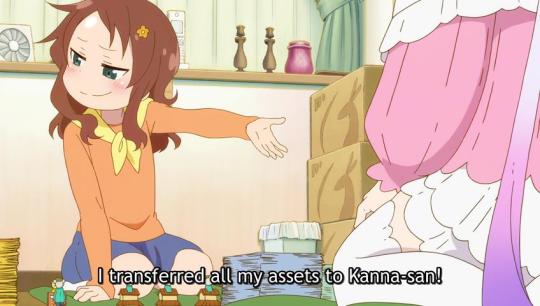
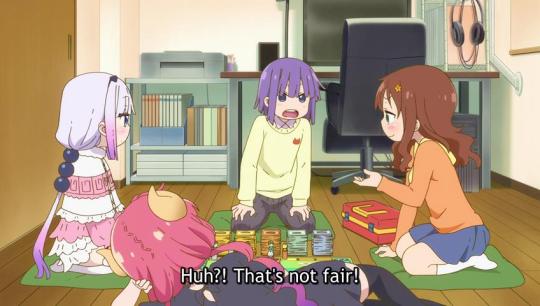

Here is 私のものはカンナのもの, lit. “What’s mine is Kanna’s!”
This line is a reference to a catchphrase of the bully/antagonist in Doraemon, Gian: “What’s yours is mine, and what’s mine is mine.”
His line, and character, is so well known it’s spawned the term “Gianism” to represent that sort of self-centered philosophy: everything is rightfully mine to take, even if you think you lay some claim over it.
It’s interesting that the inversion of Gianism, i.e. “what’s mine is yours,” is the only way Kanna and Saikawa are able to overcome the rules, beat the billionaire, and win the game.
Solidarity forever.
42 notes
·
View notes
Text
Kobayashi’s Maid Dragon S2 Episode 2 Notes
Here’s some notes for episode two, too, if you’d care to join me.
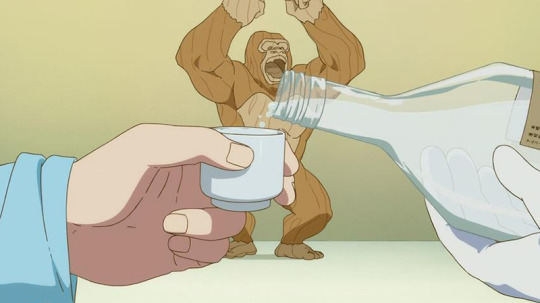
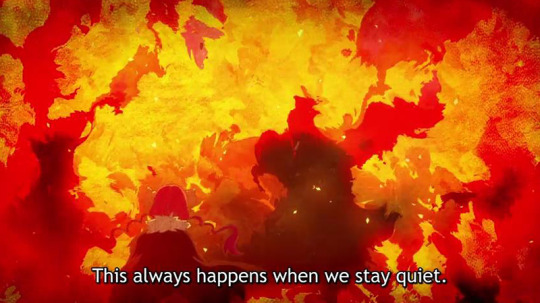
The “stay quiet” here is 大人し[い] otonashii, which takes the word for “adult” and adjectivizes it. It’s a common word with a variety of meanings, such as when something is “behaving” properly and not raising a fuss (from children to computer code to a chronic disease to political forces, all sorts of things) or when something comes across as “mature” (like a clothing design or a young person).
In this case the idea is that the dragons had chosen to “behave” and mind their own business, which (they seem to assume) led the humans into underestimating them and deciding to attack. (”Stay quiet” probably does a pretty good job of getting that across, but just to fill it out.)
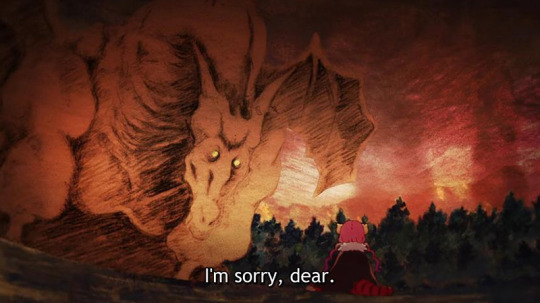
This is 残念ながら zannen nagara, or “unfortunately...”.
The reason I bring it up here, is that it’s not a particularly intimate way of speaking and leans somewhat formal—potentially implying Ilulu has no more close relatives left to give her this news (and/or maybe her family’s social position is one where other dragons had to treat them with respect).
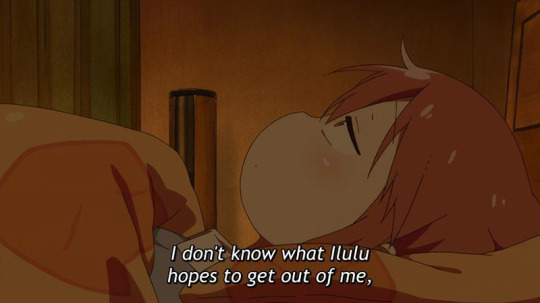
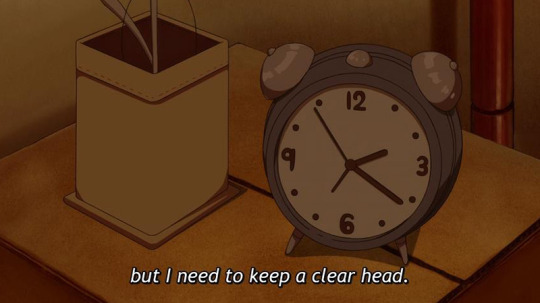
The second line here is 平常心を保つよ、私は, which is a fairly strong declaration of intent. I kind of feel like “I need to keep a clear head” sounds less confident, like convincing herself “ok bad situation, but if I just do this I’m fine.” In contrast, the Japanese imo is more of a “[Ilulu can do what she may,] but it won’t get it to me either way.” Just a mild point of characterization I suppose.
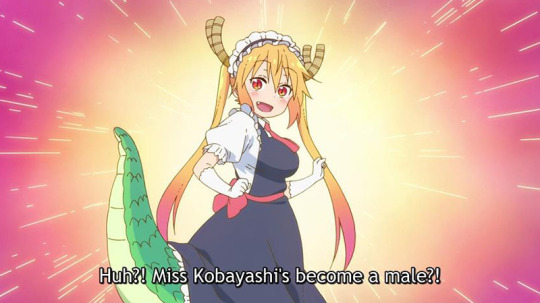
Just for clarity, she does use the word 雄 osu here, which is the more biological term for “in a sexually reproducing species, the one that produces sperm,” rather than a more gender-based term.
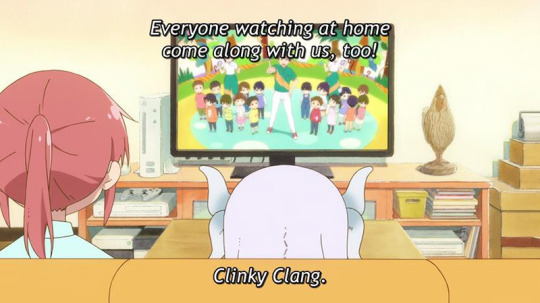
The TV show, シャシャシャシャキーン Sha-sha-sha-shakiin, is a combo reference to irl Saturday-morning kids’ variety show じゃじゃじゃじゃ~ン Ja-ja-ja-jaaN and weekday-morning シャキーン! Shakiin!.
The former’s name comes from the Japanese equivalent of ta-dah!, while the latter’s comes from the ”sound” for becoming alert, going from relaxed/sleepy/bored/etc. to “wide awake let’s go.” (though not necessarily sleep/wake related)
If you’ve seen these two emoji:
(´・ω・`) (`・ω・´)
The one on the right is the “シャキーン” one, and is the contrast to the gloomy one on the left (ショボーン shobon). Or these, going from asleep to awake:
( ˘ω˘ )スヤァ… (`・ω・´) シャキーン
In manga and stuff you’ll also see it used for e.g. someone drawing/brandishing a sword, striking a cool poses with a lens flare, things like that.
I think it gets translated to metallic-y sounds in English fairly often in those cases (like drawing a katana, or a mecha pose), hence the translation above.
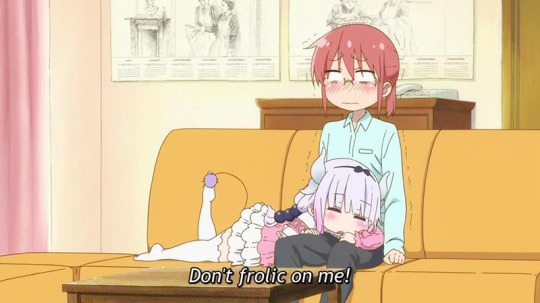
The verb for “frolic” here is じゃれる jareru (no relation to jajaan above), which is like to play/mess around, typically in a physical sense. For example it’s used in the compound word じゃれ合う jareau, which is often used in the same way English might say “playful wrestling” about kids or animals.
Though the word Kobayashi uses is actually a different じゃれる compound, じゃれつく jaretsuku, which is like playfully/affectionately grabbing/cuddling up/etc., (also primarily regarding kids or animals). There’s a bit of overlap with some of the uses of あまえる amaeru mentioned in the last episode’s notes.
Assuming I had the visuals, I’d probably just write this as “Please not on my lap...” or similar. (Kobayashi also uses a different verb conjugation for Tohru vs. Kanna in this scene, ~つくな vs. ~つかないで; Kanna’s being more plead-y compared to Tohru’s more “cut it out!” feel, hence the “please.”)
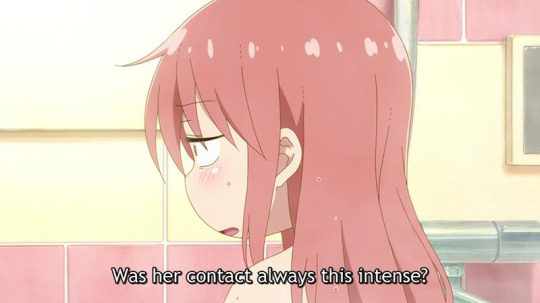
“Contact” here is “skin-ship,” a portmanteau-esque combination of skin and kinship or relationship. It’s primarily a Japanese word (you won’t find it in English dictionaries typically), but it was apparently coined by an American speaker at an international WHO seminar in 1953 (from which a Japanese attendee brought it back to Japan and it was later popularized).
The original use of the word was in reference specifically to parent-child physical intimacy, but as it became more widespread in usage the meaning extended to all sorts of relationships, from the platonic to the romantic.
One reason, presumably, that the term caught on so powerfully in Japan is that it has historically been a very touch-adverse culture (at least compared to say the US), and this extends even to parents with their children after the first few years. You’d see (and still see) psychologists recommend “more skinship” to people, for example.
The relative lack of skinship may partially explain the head pat thing mentioned in last episode’s notes (e.g. when you want to touch your kid, but hugs aren’t on the menu) and things like the old “hand-holding is lewd” meme. (Note this isn’t just me getting all orientalist here; there’s been a good bit of research on the skinship gap, and how it may be shrinking, by Japanese scholars.)
This line is also a bit of foreshadowing that Tohru has realized Kobayashi’s... situation already.
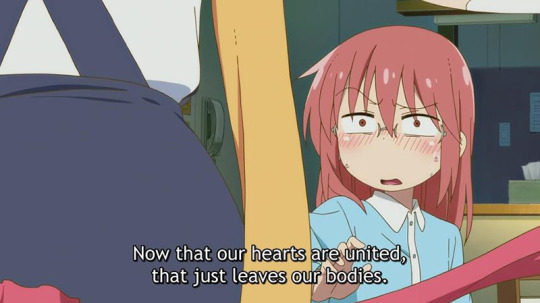
The Japanese here is 心と心でつながった後は体ですよ, which I only really mention because I kinda felt like the English’s “Now...” implied she was saying they only recently ‘connected their hearts,’ which I don’t feel from the Japanese wording and would say is probably not how Tohru thinks. E.g. more of a “Our hearts are already connected; now it’s time for our bodies!” kinda thing.
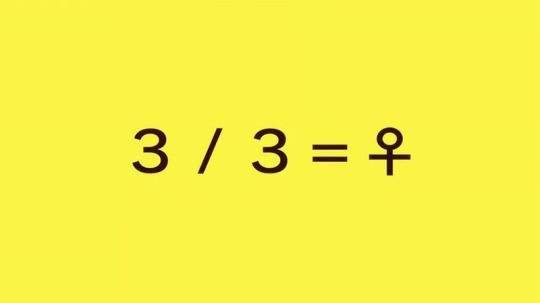
This 3/3 is March 3rd, which “equals” ♀ because that’s the date of Hinamatsuri, sometimes also referred to as Girl’s Day. The third day of the third month was originally a holiday brought over with the Chinese calendar, and it morphed from a more spring/peaches holiday into it’s more girl-oriented version at some point in the Edo period.
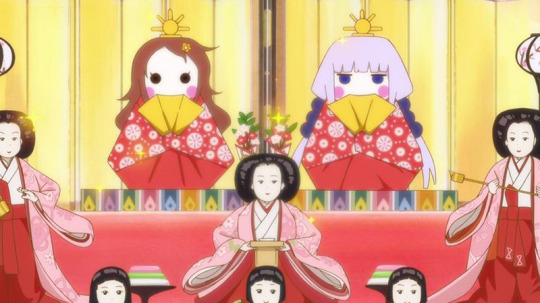
One of the highlights of Hinamatsuri is the doll displays, as pictured in this short bit with the Saikawa sisters. There are various types of displays, but this sort of staircase arrangement is the most common I believe. Each level has a certain type of doll that goes on it, with the top level having an “emperor” and an “empress” doll—which is the pair Riko replaces with dolls of herself and Kanna.
There’s some similarities between these doll displays and stereotypical Christmas trees: a family is likely to have a set of ornaments/dolls they mostly reuse each year, you put them up some time in advance of the actual holiday, then get lazy and leave them up too long put them away for a year after it’s over. A lot of businesses and such will put up displays as well.
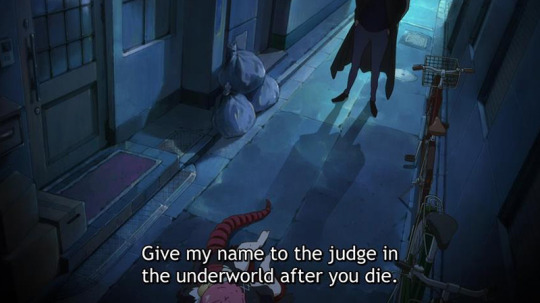
“The judge in the underworld” is left vague here and isn’t a specific reference to anything, but is generally in line with the typical “image” of what happens after you die (setting aside actual religious beliefs) in Japan.
Please see the documentary series Hoozuki no Reitetsu for more info.
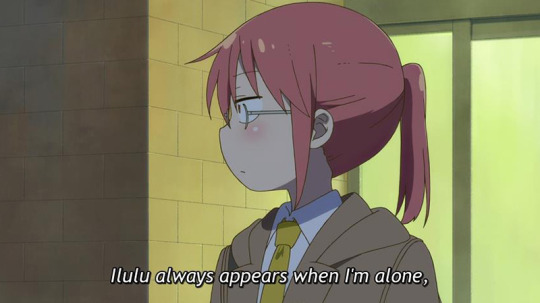
As of right now in the anime, Ilulu has only shown up twice, and only once of those when Kobayashi was alone. The implication seems to be that there have been other Ilulu encounters that we haven’t seen.
Also, for clarity, the Japanese is 私が一人の時にいつもイルルは来るから, which is more of a “whenever I’m alone Ilulu shows up” than a “she only shows up when I’m alone.” (The English could sorta be read either way I think?)
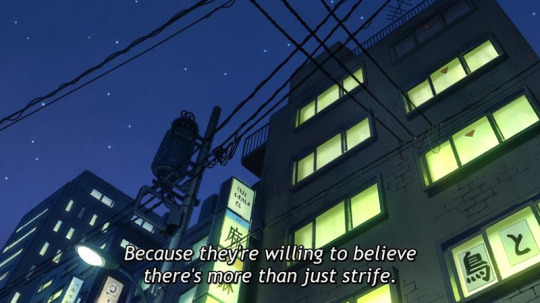
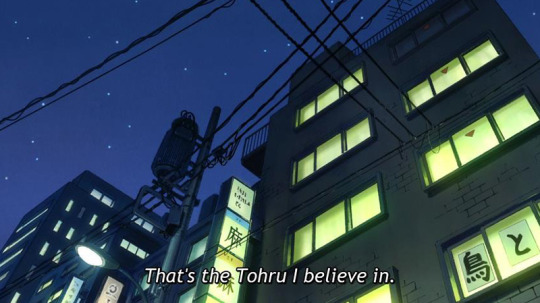
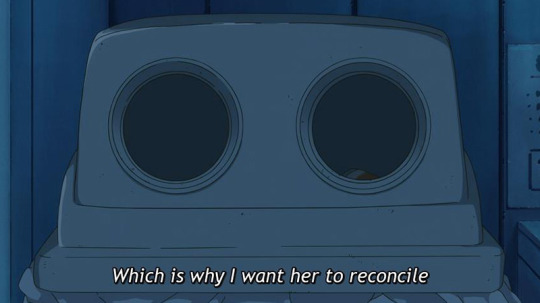
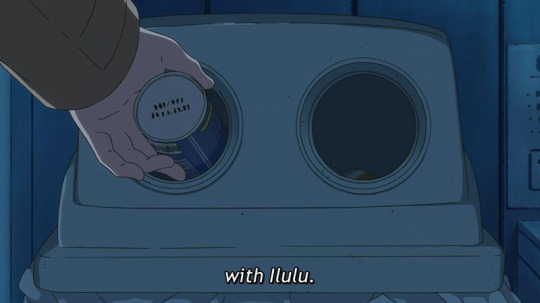
This bit is それだけじゃないって、争い以外もあると思ってくれているからだ。私はそんなトールを信じているから… だからその為にイルルと和解したい
The main point of contention I have with this English is that it implies Kobayashi wants Tohru and Ilulu to make up. However, I’d say this is more Kobayashi wanting to come to terms with Ilulu herself (and just by extension Tohru/the other dragons/maybe other humans).
That is, by making peace between herself the human and the “hostile” dragon Ilulu, she’d be helping prove Tohru’s belief correct—and she has faith in Tohru that it is (see also last season finale).
(Notably while Tohru is Chaos faction herself, there’s not really been another Chaos dragon yet to be convinced like this. Kanna is no-faction, Fafnir is technically no-faction even if Chaos-ish, Quetzalcoatl is an observer, Elma is Harmony, and Tohru’s father is an exception on multiple levels.)
Without getting too deep into the “why,” one quick thing I’ll point out is that she says 和解したい wakai shitai, not してほしい shite hoshii or させたい sasetai etc., meaning it’s something she wants to do herself, not want/make someone else do. Generally speaking you can’t use the ~たい “want to” form for anyone but yourself (you don’t know what anyone else is thinking, after all), unless quoting them, asking, or in the ~がる “seems to want to” form.
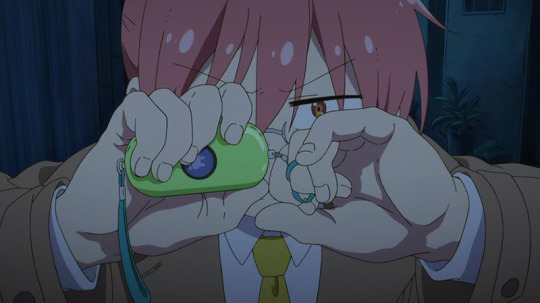
This is a 防犯ブザー bouhan buzaa, a crime-prevention buzzer, also known as a personal or self-defense alarm. They emit a very loud sound when activated. The idea is you, well, use it like she does here, when someone is trying to do a crime to you.
Since most Japanese children walk to school, it’s extremely common for these devices to given to students (either by parents or a gov’t body). It’s technically recommended for adults to carry them too, though the advent of the mobile phone has driven down carry rates.
This particular one was probably purchased in episode four of season one, if you want to rewatch and see why!
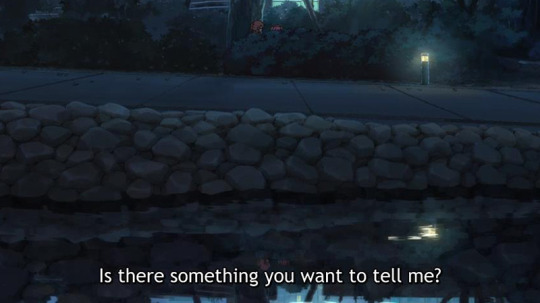
This is 私にぶつけたい気持ちでもあるの?in the Japanese.
The verb for “tell” is ぶつける butsukeru, an evocative word meaning ~to slam against (somewhat similar to “vent” in English when used with emotions/feelings).
The “something” is 気持ち kimochi, ~emotion/feeling/thought.
So the Japanese here feels a lot more expressive than "something you want to tell me,” I would say (that could just as easily be a translation of 話したいこと). That said it’s not an easy thing to express in English within the confines of the format here, especially if you want to keep the “target = ‘me’” part.
It might feel somewhat like “You got something bottled up you wanna hit me with?”, though I doubt if I’d use that either.
As a side note, the manga has Kobayashi say an extra line after this, about being the “main tank” to take her “hate” (Japanese for “aggro” in MMOs).
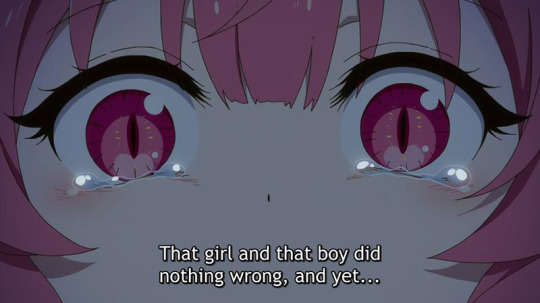
A small note that “that girl and that boy” is あの子とあの子 ano ko to ano ko, so no gender specification in the Japanese (it’s a good language for talking about people without specifying a gender!).
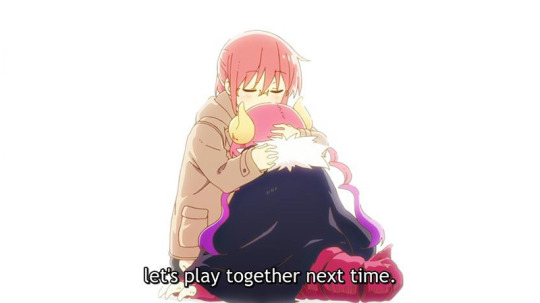
“Next time” here is 今度 kondo, which is an interesting word because you can situationally use it for “recently,” “this time,” “next time,” or “soon.”
The reason I bring it up here is the English “next time,” personally, leaves me thinking “Was there a previous time? What ‘next’ do you mean?”—just a heads up that that’s not really an issue in the original line.
Also: this whole extended scene with Kobayashi saving Ilulu is one of the “many senses” mentioned in the episode title. (see also episode one notes re ikemen)
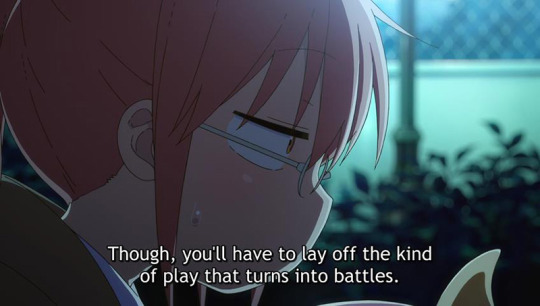
As an aside, this "play” is じゃれ合い jareai, the noun form of the jareau that was mentioned in the above “frolic” note.
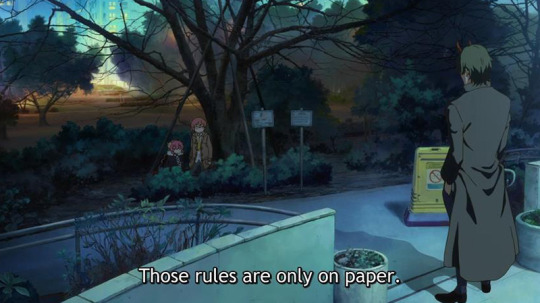
If you were wondering: “Do dragons use paper?”, the word here is 形骸化 keigai-ka, (almost) lit. ~reduced to bones, meaning something that once was strong/effective is now basically just a formality. It’s similar to the phrase “dead letter” in reference to old laws that aren’t really enforced anymore.
So two potential points of ~lore relevance~ here: 1) the rules probably used to be enforced, 2) we have no evidence (either way, from this) that they actually have them on paper somewhere.
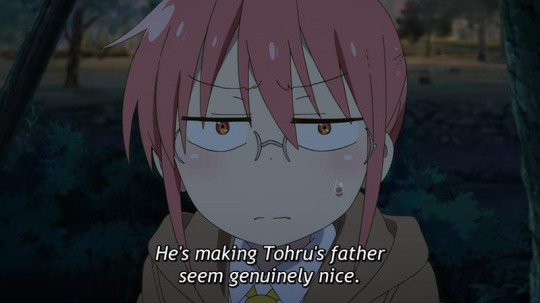
こりゃトールの父ちゃんは本格的に優しかったみたいだな
This might just be me reading too much into the English (again), but one difference in nuance between these two lines is that the English has Kobayashi implying Tohru’s dad “seemed” kind (which implies he’s not really kind, just kind in contrast to this villain), while the Japanese is more taking this as evidence that Tohru’s dad was actually being kind (see also last season finale).
For those wondering if the みたい in that line would imply a “seems”: it sort of does, but it applies across the whole observation here. I.e. “seems Tohru’s father was genuinely nice” vs. “making Tohru’s father seem genuinely nice” (which I’d guess would probably use 優しく見えてくる or something).
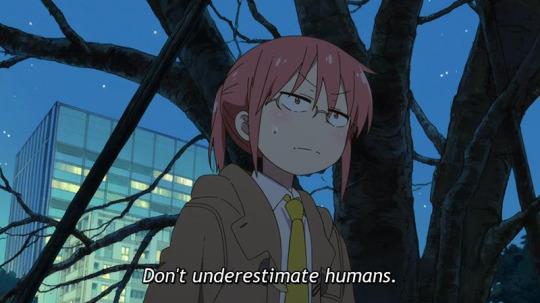
When you see “underestimate” in anime, most of the time it’s なめる nameru. It comes from the verbified archaic adjective 無礼し nameshi, meaning a combination of looking down on, acting rude towards, etc., and uses the same characters as “rude” (though often written in hiragana/katakana).
It also is a homonym of the verb “to lick,” so “Don’t underestimate humans” sounds identical to “Don’t lick humans.”
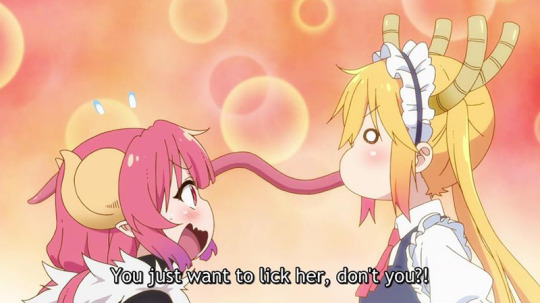
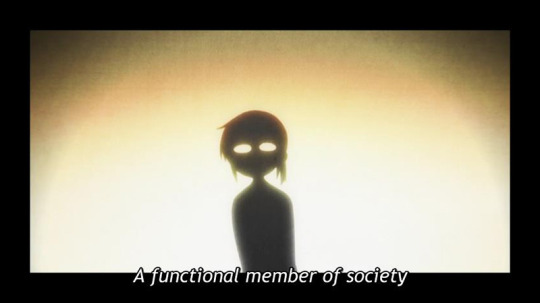
“Functional member of society” is 社会人 shakaijin, ~lit. person of society, which is a very commonly used word to refer to basically anyone who is an active member of society. It includes homemakers, so it’s not strictly “has a job at a company,” but in many contexts it’s used like “people with jobs” versus “students and NEETs.”
(Not that there’s anything wrong with the translation, just some extra context.)
A technique reminiscent of this shadow puppet silhouette style was also used in Hyouka, another Kyoani show and one directed by the late Series Director Takemoto Yasuhiro.
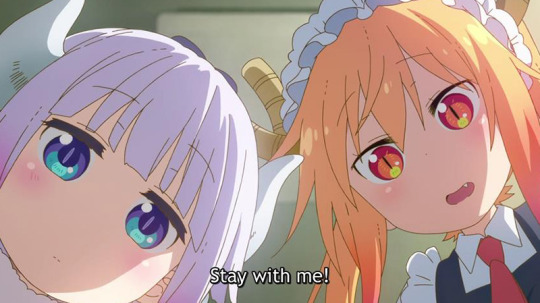
I kind of feel like yelling “Stay with me!” at someone injured is something you do when they’re in danger of fading away, not when they’re waking back up? Maybe that’s just me.
The Japanese is お気を確かに o-ki wo tashika ni, a polite (since Tohru almost always speaks kinda formally to Kobayashi, as part of the maid thing) way of saying “pull/hold it together,” and is used in a variety of situations.
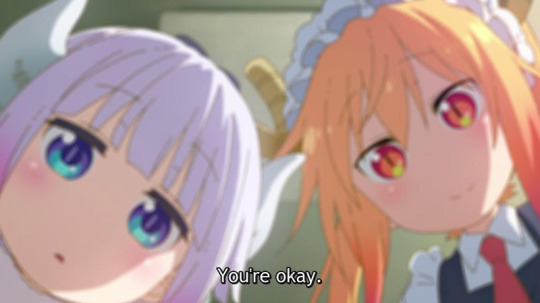
Kanna’s line is a question (e.g. like “are you okay?”) in the Japanese here, whereas the English sounds more like something you say to someone who’s injured to try to reassure them.
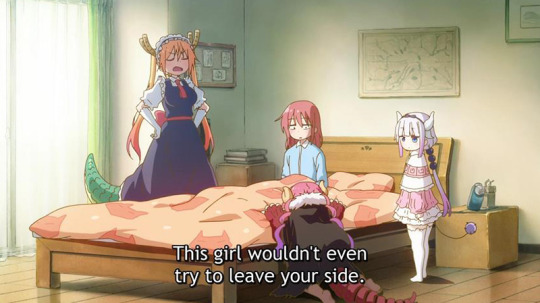
This line is その子離れようとしないんです sono ko hanareyou to shinai n desu.
The English is a pretty literal translation: hanareru is the verb for leaving/separating (in some senses), and the ~you conjugation means “try to ~”. However, that conjugation also has a second use in just indicating intent—especially when used in the negative, like here—so e.g. “She didn’t want to leave your side,” or “She wouldn’t leave your side at all.”
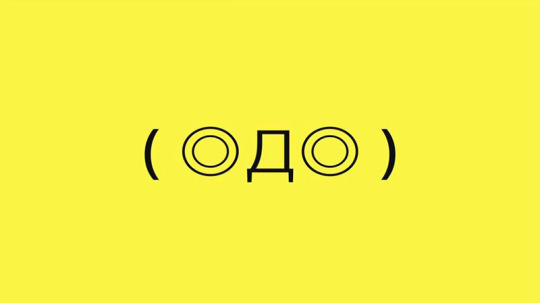
(◎Д◎)
Just in case: this is an emoji for expressing shock.
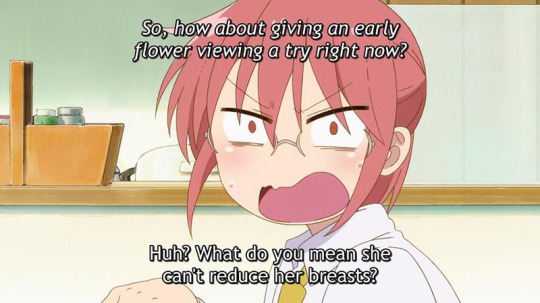
One thing that is left out of the English in this line is the だけ dake, “only.”
So Kobayashi’s not necessarily surprised at this by itself, but in contrast to the fact that Tohru says she probably can hide her claws/tail (so why not this too?).
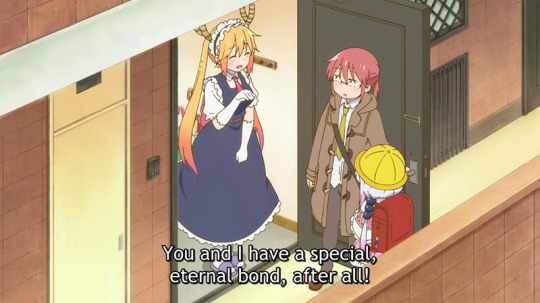
The base phrase Tohru is saying here is 私たちの仲じゃないですか, which roughly means “that’s just our relationship,” and is used commonly when being thanked for doing a favor for someone close. It’s similar in meaning to something like “hey of course, no problem, I know you’d do the same for me.”
Tohru puts a little spin on it by adding the “eternal” to make it 永遠の仲, which is a separate phrase that means probably what you’d think it means.
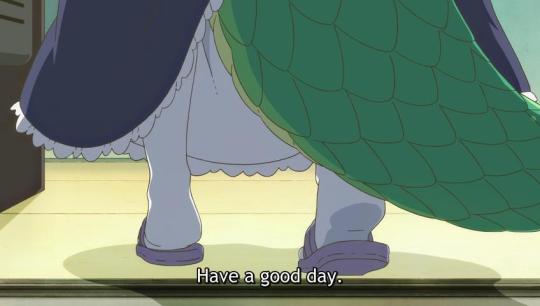
This quick cut to Tohru’s feet and the light “foot pop” motion... I have a hard time believing it’s anything but the director trying to give some subtle “goodbye kiss when leaving for work” vibes, even if they aren’t literally kissing. Just me?
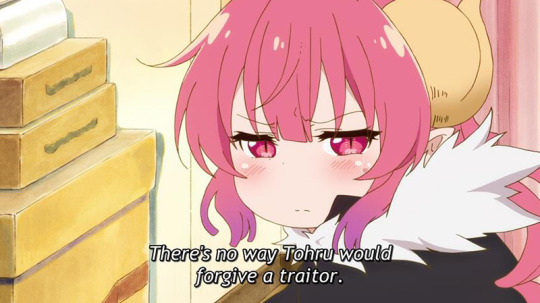
Here she says あのトール ano Tohru, lit. “that Tohru,“ which in this sort of context carries a meaning similar to using an italicized “that” in English: not just any Tohru, but that Tohru, the famous one. The implication is that yes indeed Tohru is well-known among other dragons—and known to be quite strong and merciless.
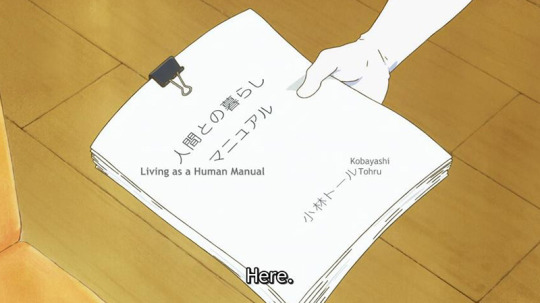
It’s not a particularly big deal, but technically this is 人間と, i.e. Living with.
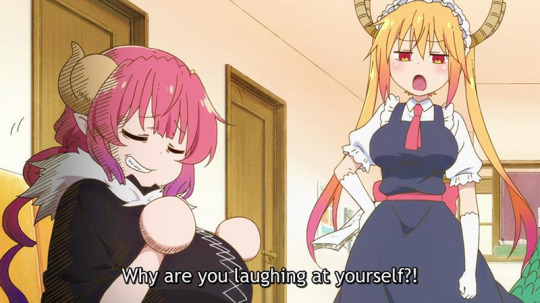
The ball hands thing is generally thought of as “Doraemon hands” in Japan. Doraemon gets the name from the food “dorayaki,” but “Dora” is also how you pronounce the first two syllables in “Dragon” (ドラゴン doragon).
Keep this in mind.
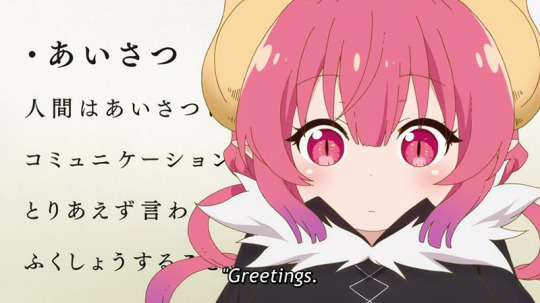
挨拶 (あいさつ) aisatsu, often translated as “greeting(s)”, is a lot bigger of a thing culturally for Japan than it might be for where you live. Though translated as “greetings” it also includes farewells and more. Basically a general term for “in X situation, say Y” style semi-set phrases.
In more traditionally minded companies, for example, employees are often expected to give a rote ohayou gozaimasu when they arrive (even if they think no one is around to hear it), and may get chewed out for not doing so or half-assing it. Then when passing someone in the hallway etc., an otsukare-sama desu, and yet another phrase when leaving for the day. Also the ittekimasu and itterasshai (when leaving home/saying bye to them) or tadaima and okaeri (returning home/welcoming back) that probably many anime-watchers are familiar with. Even itadakimasu is an aisatsu.
Obviously every culture utilizes “greetings” like this, but in Japan they’re pretty heavily ritualized and treated as a cornerstone of human relations, a key part of showing respect for your fellow humans (even people you hate!) and ensuring the smooth working of society. It’s not the thing they chose to have Tohru put first in her “living with humans [in Japan]” notebook for nothing!
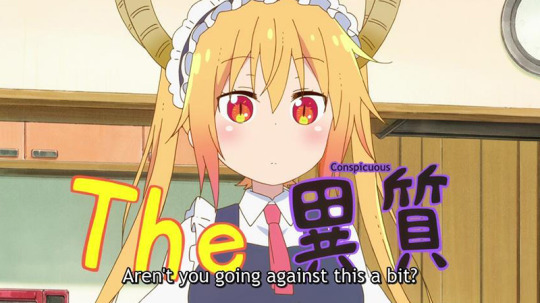
The English “the” is a popular word to use in Japanese as an intensifier, similar to how it’s used in a sentence like “this isn’t just an [example], it’s the [example]!”
It’s usually pronounced “za” and often written that way in katakana (ザ) for this usage. (If you type “za” in a Japanese IME, most will offer up “the” as one of the options to convert the text to, even.)
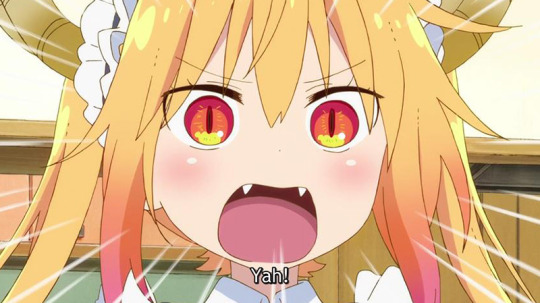
The word she says here is 喝 katsu, which, in this sense, is a stereotypical thing for a Zen teacher to say to a student as a stand-in for explaining some deep Zen concept that words can’t describe. So here, it’s kinda like “Yes this may seem contradictory, but really it’s just too complicated for you! No more questions!”
Obviously that’s oversimplified and it’s used in other ways too (see Saikawa’s father during the sports festival), but just for the purposes of this joke, there you have it.
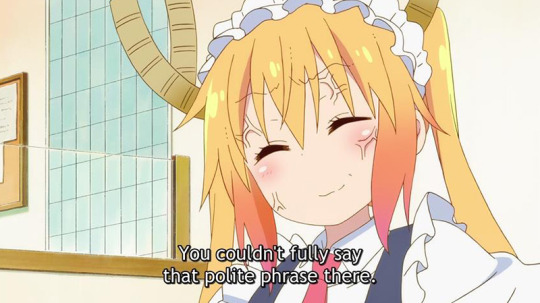
The word used in the Japanese here is 建前 tatemae. If you’ve ever studied any Japanese, you’ve likely heard about honne vs. tatemae, your inner feelings vs. the front you put up for social reasons.
People new to the language are sometimes prone to approaching that distinction with “well why doesn’t everyone just honne all the time, why play games?”, but of course almost everyone splits themselves like this. You probably hate your boss, but you also probably don’t tell them that to their face to avoid getting fired. Or maybe you have some family members you can’t stand, but act nice around anyway because it’s not worth the trouble to start fights.
Japan just put names to the idea, and maybe leans a little more toward encouraging tatemae in more situations.
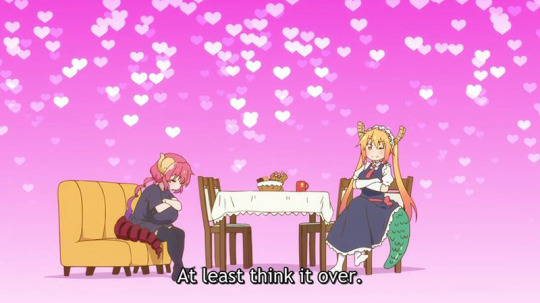
This is せいぜい悩むんですね.
せいぜい seizei as an adverb means doing something to utmost extent one is capable of. You’ve likely heard it from a villain somewhere saying something like “Struggle all you like, wahaha!”.
Though it’s not necessarily down-talky like that, in modern times that is the trend (you can use it for yourself no problem, but if used to talk about someone else’s actions it may come off as belittling). Tohru, as one of the strongest beings in the setting and with the pride to match, uses it a lot.
悩む nayamu is to worry, fret, ruminate over (some difficulty etc.).
The sentence in general is one that is highly context dependent, but here it’s Tohru thinking to herself, somewhat impressed, that Ilulu is actually putting serious thought into the question of what she wants to do with her life.
And, as the background suggests, finding it surprisingly adorable/admirable; up until just a few days ago, Ilulu was known as one of the most extremist Chaos faction dragons obsessed with nothing but destruction, yet look at her now. In a way, Tohru’s taken over an older sister kind of role for her.
(For the curious, if the ね was dropped or swapped to a よ here, that would imply she was directing the comment “at” Ilulu, rather than saying it in observation.)
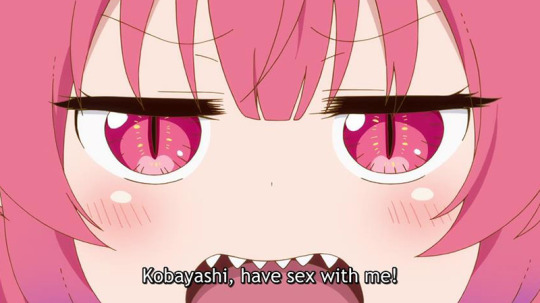
The word here is 契る chigiru, which usually means to swear/pledge (e.g. swear a pact, pledge your love), but can also be a somewhat fancy word for having sex, especially of a married couple.
I feel like I personally would have used more of a euphemism for the translation.
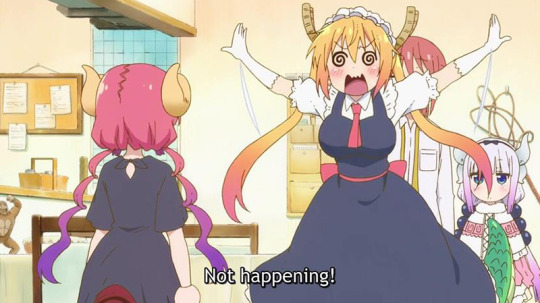
The phrase here is ダメの助 dame-no-suke, where dame is no/bad/can’t do/useless, and (no)suke is a common ending to first names; both actual names and sort of on-the-spot nicknames; someone looking sleepy might be called a 寝坊助 nebou-suke in the same way as “sleepyhead.”
Or, as here, sticking to the end of things for comedic effect or as indication of a panicked/confused thought process.
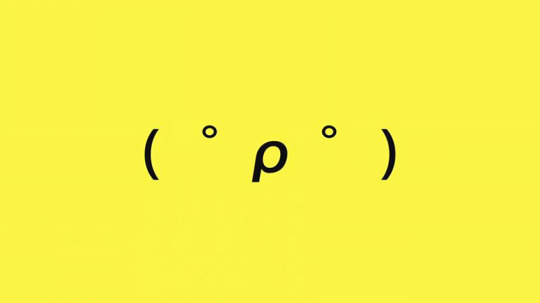
( ° ρ ° )
Just in case: this one is also expressing shock, but a kind of dumbfounded shock. The ρ is a drooling, slack-jawed mouth.
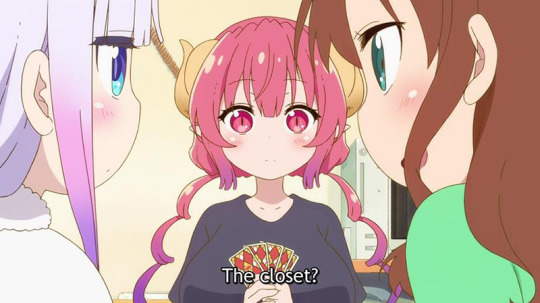
In the next episode preview they talk about where Ilulu will sleep, since they don’t have room for another bed. Ilulu wants to sleep in the closet—or more specifically, the 押し入れ oshi-ire, which is a particular closet layout you’ll find in many Japanese bedrooms.
The typical difference is that an 押し入れ was originally designed for 和室 washitsu, traditional-style Japanese rooms with tatami floors, primarily as storage space for folded-up futon/blankets/pillows, as you would put those away during the day to free up space. Thus they typically are rather wide, mildly deep, and have a waist-height, solid horizontal divider capable of supporting a lot of weight.
They actually are pretty okay for sleeping in if you’re not claustrophobic or tall.
Anyway, I bring this up because you know who else very famously sleeps in one of these? That’s right: Doraemon.
#maidragon#kobayashi's dragon maid#kobayashi-san chi no maid dragon#miss kobayashi's dragon maid#anime#translation notes#season 2
18 notes
·
View notes
Note
Thank you so much for your translation notes; they are always so highly detailed and interesting to read! I was also very excited to find that you had written translation notes for the first episode of Miss Kobayashi's Dragon Maid S. I had previously read your notes on the first six episodes of the first season (which were very helpful!), and I was wondering whether you wrote any on the other episodes of the first season? If so, I cannot find them on your blog :) Just wondering!
Thanks, I'm glad you find them enjoyable!
I haven't done notes for eps 7+ season one, but I'm hoping to go back and do those once I'm caught up with season two.
3 notes
·
View notes
Text
Kobayashi’s Maid Dragon S2 Episode 1 Notes
Miss Kobayashi's Dragon Maid, season two! Welcome back Kyoani. Here’s some notes on episode one.
(As a reminder, these notes are a combination of translation issues, things I thought might go unnoticed without certain cultural context, and info on certain Japanese words/phrases for language learners. Feel free to just skim past any that don’t seem like they’re up your alley!)
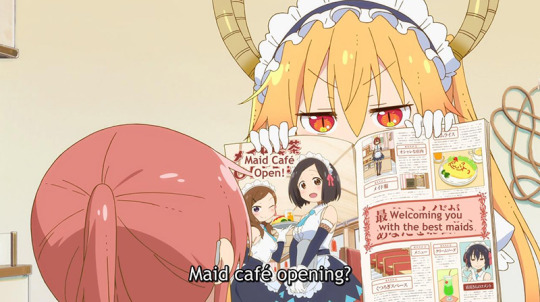
The magazine spread here lists six points on why you should visit (though all we can see are the section headers). For the curious, the points are:
the maid uniforms
the fashionable interior design
the omurice (more on this later)
the booths, great for hanging out/relaxing/etc. (reminiscent in my opinion of Japan’s family restaurants, which have a reputation of being a place you can just order something light/cheap, like unlimited refill fountain soft drinks, and hang out for a few hours)
the menu
“cream soda,” aka ice cream floats (ice cream in soda) made with, typically, the green “melon soda” we see in the image. You don’t see melon soda too often outside Japan, but it’s a staple at most establishments you’d expect to sell soda. It doesn’t taste like melons, but it's worth a try if you see it (and like soda).
The last section header there is for a comment from the café staff.
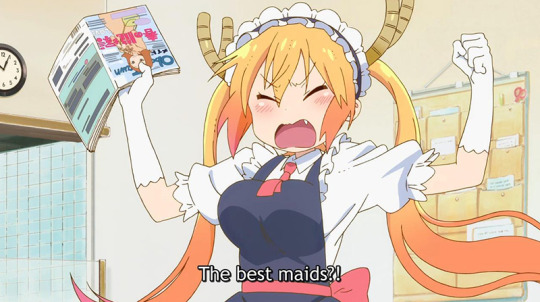
The magazine here seems to be a local one (titled I think Oboro Town, as the place they live is Oborozuka), with the other text indicating it’s a spring edition introducing stuff about the area, including (obviously) something on maids. If you live in Japan, there are decent odds your local municipality will have a monthly magazine or newspaper-like thing along these lines with local business spotlights, news, lifestyle tips, etc. (checking my last one, it had a feature about how to avoid heat stroke this summer).
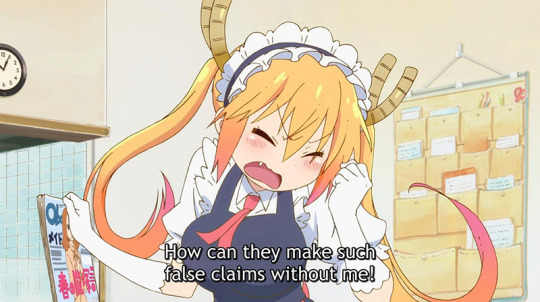
“False claims” here is 誇大広告 kodai koukoku, lit. exaggerated advertising, is Japan’s equivalent of false advertising (i.e. it's against the law).
The “without” in “without me,” is 差し置いて sashi-oite, which works as an adverb for doing something while ignoring something (an existing plan, a person who should have gone first or been consulted, etc.). “Without me” is basically correct, though imo the original skews a little more toward “how dare they claim to have the best maids—I’m the best maid!” versus “how dare they claim to have the best maids when they don’t have me, the best maid!”. (the latter maybe feels like it runs a little counter to the shock factor of the later "and now I work there" joke?)
Hence Kobayashi’s “yeah false advertising sure is bad, too bad you’re doing it right now.”

Kobayashi’s line here is まさにもえもえ!? masa ni moe moe!?, a classic pun on 萌え moe (the nerd term coming from “to bud/sprout”) versus 燃え moe (“burn”); the 萌え萌え maidragon is 燃えinating the countryside. As comes up later in the episode, “moe moe kyun” is the stereotypical example of a maid café "spell" line.
(Kyun being a phenomime—like an onomatopoeia for things that don’t actually make sounds―for your heart “squeezing” when seeing something cute or when someone does something romantic for you, etc.)
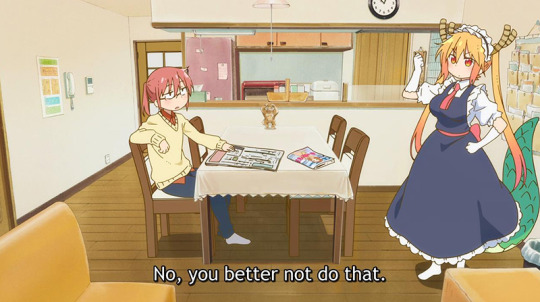
This is いや絶対にやめろよ iya zettai ni yamero yo, which I’d argue is a lot more of an absolute than “you’d better not do that” (though italicizing it to “you’d better not do that” to give it a hint of a threat might've worked okay, at least for those of us with a parent who spoke like that!).
This bit is especially painful when thinking about the Kyoani arson incident… Though props to them for being able to make jokes about it now.
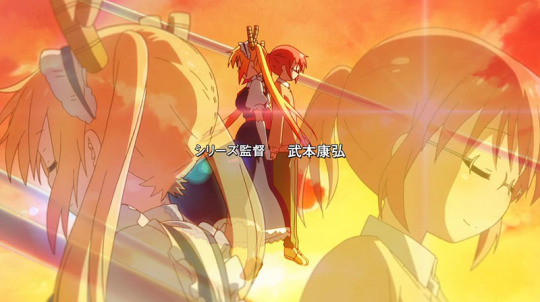
The OP has various references to previous Kyoani stuff here and there, for anyone who wants to go compare.
The unusual credit of “Series Director” here is listed as being filled by Takemoto Yasuhiro—the director of the first season, and one of the people who died in the arson. Now I’m gonna cry every episode…
The director for this season is Ishihara Tatsuya, who directed Haruhi and Nichijo, among other Kyoani titles.

“Evil den” is 伏魔殿 fukumaden, a term originating I believe from an old Chinese novel you may have heard of. As the characters of the name suggest, it refers to a mansion hiding demon(s), and is used colloquially as a place/area that may or may not look fine on the outside, but is dangerous and the source of some evil or trouble. Apparently it’s also how they translated Pandæmonium, the capital city of Hell, in the Japanese edition of Paradise Lost.
“Maid café” kind of feels like it needs no explanation these days, but generally refers to a variety of café-style restaurants where the wait staff is primarily women in maid outfits (several other variations, like the butler café, where the wait staff is primarily men in butler outfits, also exist). Stereotypically they’ll have a mild role-play aspect, where the customer is the head of the house returning home (rather than a rando visiting a restaurant), though that’s not necessarily a requirement. They also have a variety of… other services, that will be touched on later in the episode.

This line is 頼もう tanomou, and it’s the stereotypical line someone says when they’re a martial artist storming uninvited into another fighting style’s dojo to challenge them; if they beat the representative the dojo throws at them, they get to take or break that dojo’s nameplate. Dojos weren’t allowed to operate without a nameplate, so this meant they needed to pay out the nose for a new one, or close. It was typically a pretty embarrassing thing, so often you’d get a lot of the dojo’s students leaving (and likely joining the stormer’s instead) as well. This practice is called 道場破り doujou-yaburi, lit. dojo-breaking, though a lot of people think it’s significantly more popular in fiction than it was in real life. It’s also been a thing in pro wrestling.
So Tohru is coming to drive this impudent, false-advertising den of maids out of business, or so she thinks.

Maybe not-so-fun fact: A lot of Japan’s convenience store and fast food staff are “housewives” with part-time jobs. Part of the reason for this is that the tax code gives the “primary” earner in a family a significant tax deduction for a spouse, but the deduction disappears if the spouse makes over a certain annual sum. This incentivizes spouses to only get a job that won’t pay too much/have too many hours, as the family actually loses some money over that threshold (ironically it almost kind of works how people who don’t know what marginal tax rates are think tax brackets work... or how a lot of US social programs operate).
Setting aside the social issues: D’aww they’re a married couple.
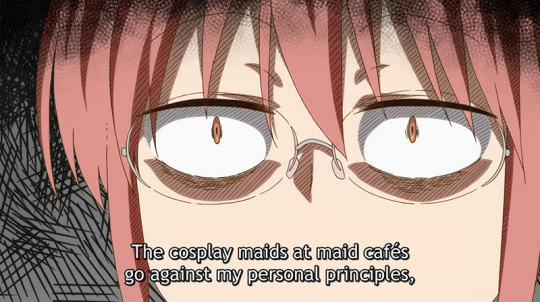
Reminder that Kobayashi has very serious opinions about maids. (And also has “dead fish eyes” as a defining feature thanks to stress/long hours at work.)
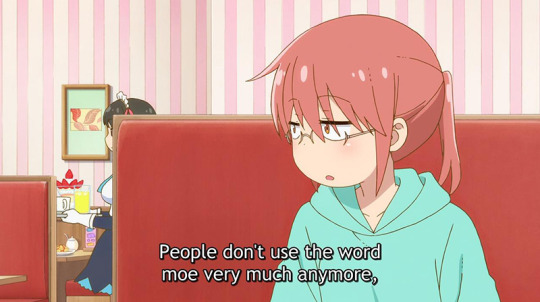
As Kobayashi says, moe isn’t as common as it used to be, though you still see it used on social media etc. Most commonly I think it’s used as the verb (e.g. you see a fanart of a favorite character being cute and it gives you some feels: “Moeru...”) or in something like “gap moe,” the moe felt when someone betrays your expectations in a good, cute way (a stereotypical example being when a rough-and-tumble delinquent type adopts a stray kitten).
More recently in this sphere, though not “new” exactly, is adjective 尊い toutoi (noun 尊み toutomi), which is kind of like “precious” plus almost-religious worshipful undertones. Whereas moe is something you feel as the observer, toutoi describes the person/character being observed. A spinoff is 尊死 toutoshi, a pun on how 尊し toutoshi is another (archaic) way of writing the same adjective, that combines 尊 with the character for death, to mean ~"so precious I died."
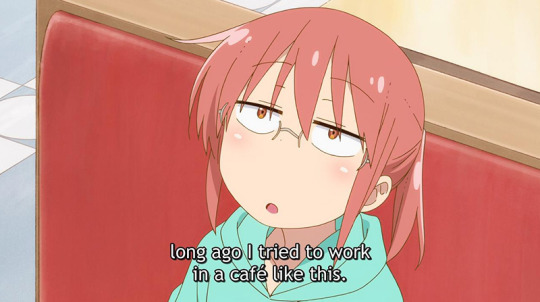
Side note: she says バイト baito here, referring to it as a part time job and implying this would have been while she was in high school or college. Young Kobayashi…

The calendar on the wall here is an event schedule. Maid cafés may hold special events, which can be things like birthdays, other holiday celebrations, or themed days with different uniforms (e.g. yukata).
The chalkboard lists the maids’ schedules for the month, so customers can plan their visits around who they want to see.
The corkboard has pictures of the maids and presumably their work names.
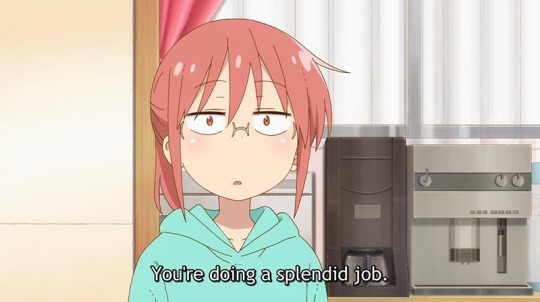
This is more for the Japanese learners, but:
The line here is 大活躍じゃん, daikatsuyaku being a stronger form of katsuyaku, one of those words that is often mildly annoying to translate due to how broad it is. In a lot of ways it’s just “being active” within some sort of field, but with strong connotations of being really successful+impactful and, often, in a way that’s worthy of praise, going above and beyond. “Doing a great job” sums it up reasonably well here, though you might argue it’s missing a bit of the “impactful” part (since she’s still the staff rookie but has already been given control of the kitchen).
The じゃん jan is short for じゃない janai (casual form of ではない), which taken literally is a negation of whatever comes before it (e.g. “she isn’t doing a good job”). However, it has three other main uses colloquially: asking confirmation (“isn’t she doing a good job?”), adding emphasis (“wow she’s doing a great job!”), and reminding/pointing something out (“hey, she’s doing a great job”).
Anyway personally I’d say “splendid job” is a bit too formal sounding for how Kobayashi generally speaks, including here, but it’s a minor thing.
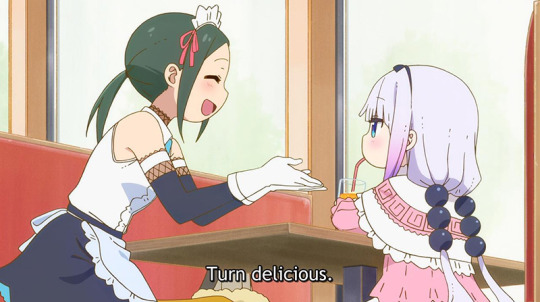
Here we see one of the maids doing one of the “special services” previously mentioned. The “standard” thing is to have the server cast a “spell” on the meal to make it taste better, and often the customer is encouraged to do it as well. Some places that are more focused on the special services gimmick will also have song/dance routines, allow photos to be taken with maids, etc.
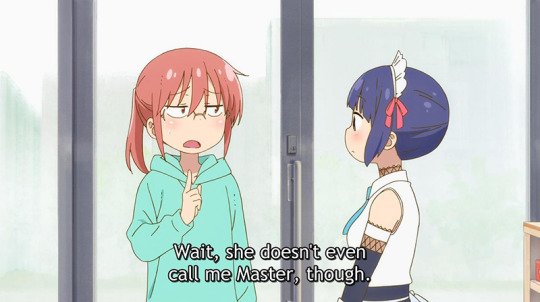
Quick mention that here’s an example of じゃん used in the “pointing out” sense.

The 食ぃレビ is a parody of 食べログ (Tabelog)... which makes the 5 star rating insanely impressive, because almost no restaurants hit 4 stars there; it’s normal to give a perfectly good experience a 3-star rating.

As a reminder from last season, Tohru spent a bunch of time perfecting her omurice specifically, so it makes sense it’s getting all this praise. Omurice, of course, being a Japanese comfort food that consists primarily of an omelette over rice that has been fried with chicken, onion, and ketchup. Often then topped with more ketchup, sometimes drizzled into a picture or a message.

The part of the episode title in parentheses, またよろしくお願いします mata yoroshiku onegai shimasu, is I think less talking about the new dragon ("her"), but rather a direct message from the creators to the viewers; a “Hey we’re back again! Please watch, and hope you enjoy!” kind of thing.
よろしくお願いします is one of those all-purpose phrases for interacting with people politely. Joining a new group? Sending an email? Asking someone to do something? Giving a morning greeting? Politely hoping people will watch your anime? It’s used for all these and much, much more (even when the literal meaning of the words might feel out of place).

The yellow lines here are mayo :)
Who doesn’t love some egg-and-mayo toast for breakfast?
(For reference, most mayo in Japan tastes rather different than the kind you're likely to see in e.g. the US; it's thicker and tangier, often primarily made with egg yolks—no whites—and apple vinegar.)
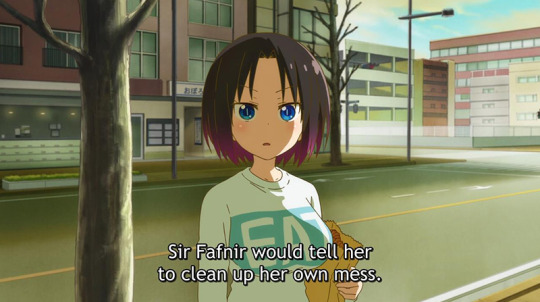
The Japanese phrase here for “clean up (one’s) own mess” is 自分のケツを自分で拭け jibun no ketsu wo jibun de fuke, which quite literally is “wipe your own ass.” It’s used in a wider variety of situations that you might expect given the apparent vulgarity though, so it’s not too surprising to see it toned down a bit in the English here.
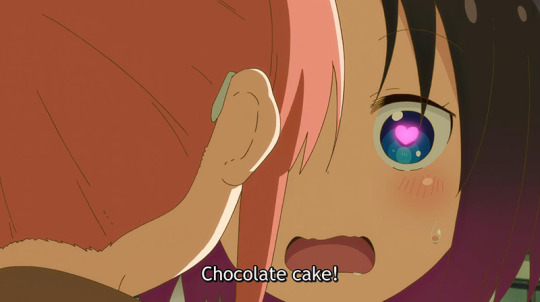
The specific variety of chocolate cake being referred to here is ガトーショコラ gatou shokora, a Japanese loan-word version French’s gâteau au chocolat. In theory it just means “chocolate cake,” but in practice it’s a very thick, moist type of chocolate cake made with a lot more chocolate and eggs than usual, and very little flour (you can use powdered almond etc. instead even).


If you’ve watched other anime, you may have noticed the head pat thing. Maybe it’s also a thing where you live, but for many of us it’s not really! It’s primarily a gesture of praise and affection from parent (or other trusted adult/older sibling) to child, that in some intimate cases is done between adults—so here we’re seeing a big moment of intimacy (well, you probably could tell that part anyway) between Kobayashi and Tohru.
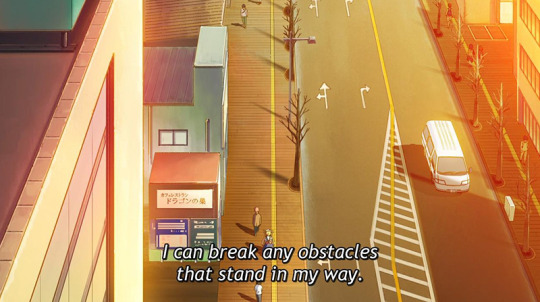
The sign here is for “Café Restaurant: The Dragon’s Nest.”
Her choice of wording here (break/壊す) seems relevant! We’ll see if that bears out.

♪⌒ヮ⌒♪


This whole scene is a reference to a common phone scam in Japan, オレオレ詐欺 ore ore sagi, or the “It’s me it’s me” scam. The idea is to cold call people and hurriedly introduce yourself as just “me,” and that you’re in a lot of trouble and need some money immediately (e.g. you lost an envelope of cash at work—envelopes full of cash being more common in Japan than you might think). Generally the hope is to get an old person who is a grandparent, as that generation tends to have money and is more likely to think “oh no I must save my grandchild!” and fall for the scam.
Typically the scammer will ask to have money wired directly to another bank account, which is a basic function of Japanese banks and a super common way of moving money around (you can do it yourself from ATMs easily). This scam is a big enough social problem that every time you go to wire money from an ATM, there is a screen that asks you to make sure you’re not getting scammed.
I’m not sure it comes across in the English, but the punch line here is that she doesn’t call it out (or perhaps even recognize it) as a scam, but she still says effectively “rip,” indicating she has zero intention of sending the money they’re asking for.
If trying to translate the joke, I might put something like “Well, good luck with that.”
(The dance+flute thing is probably a snake charmer joke, since she’s the "feathered snake" etc.)

The last train of the night tends to be around midnight in most Japanese cities, including Koshigaya (which is in Saitama but is part of the greater Tokyo metropolitan area), which Oborozuka is based on. Just a reminder that Kobayashi still works those crazy long hours.

The core question here is なんで...暮らせる nande kuraseru, which in this case I would say is more of a “how” can you live with a dragon, than a “why.” The verb here is conjugated into the potential form, so it's like a "why are you able to live with" versus "why are you living with." Kobayashi’s answer and Ilulu’s followup question seem to support that idea as well.

A lot of Japanese roads will have “stop signs” for cars printed on the roads themselves directly, as seen here. It’s some pretty clever framing for the shot visually, as “Stop” is probably exactly what Kobayashi wants her to do right now.
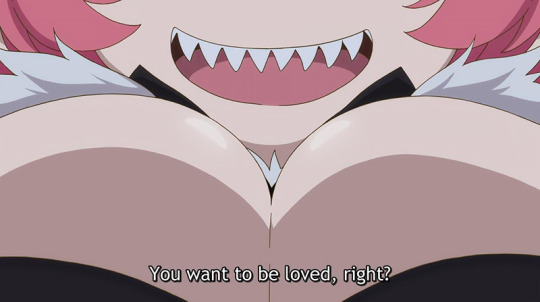
This verb is 甘える amaeru, which is a bit of a complicated meaning. It’s like “taking advantage” of someone or acting spoiled, but not always in a bad way necessarily; for example as a parent, you want your child to do this some, because you want them to rely on you. It’s a thing in other relationships as well, from romantic ones to work ones (like senpai-kouhai, where the senpai is supposed to have a duty to look after the kouhai—paying for a meal or helping with overtime work etc.); if you’re very close with someone, you don’t want them to try to do everything by themselves.
There’s not a great single direct translation, but in some cases, for example, the phrase “I’ll take you up on that” in English is often used in a similar way (e.g. when accepting an offer from someone to pay for your meal etc.). (the Japanese in that case likely being some variant on お言葉に甘えて)
A subset of that meaning is more of a purely physical one. When your cat comes up and climbs up on your lap and rubs it’s head on you, it’s amaeru-ing. Same with a young child that climbs up on a parent’s lap or asks to be held, or a romantic partner who comes home from a tiring day at work and wants a hug first thing. Or in other more sexual ways as well.
Anyway my point in laying all that out is to say that she’s not really saying “don’t you want to be loved?” per se. I’d argue that runs counter to Ilulu’s point/thought that Kobayashi's relationship with Tohru is strictly lust-driven, and her desire to prove that point by seducing Kobayashi. That is, if Kobayashi responded with “yeah I want to be loved?”, that does nothing for Ilulu’s argument. For this specific instance something like “you want to have some fun, don’t you?” might be more appropriate.

Like most of the location names in this show, Tatsunokuchi (瀧ノ口) is a dragon pun. Technically the 瀧 character isn’t dragon, but “dragon plus water” (waterfall), but the idea is clear. This one means then “mouth of the dragon.”
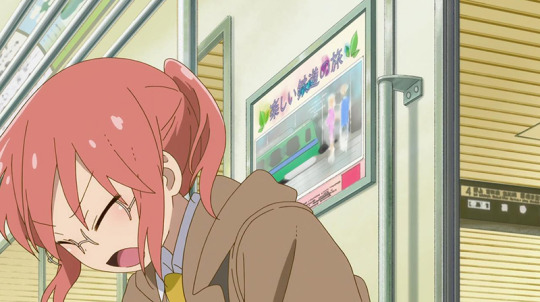
The train ad here is… actually for the train line itself! Sort of. A lot of train lines run ad campaigns encouraging people to go on local trips to some of the more interesting (or obscure) places located on that line, which is what this ad is probably in reference to. It says basically “[Take an] Enjoyable Trip with the Train.”
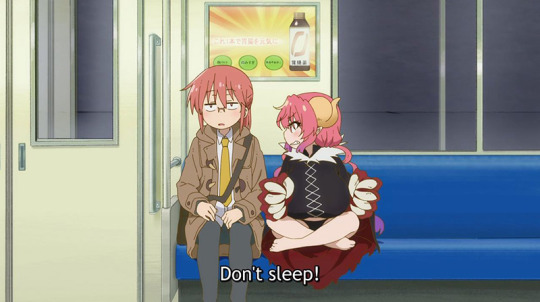
The ad behind Kobayashi here is for a drink to cure stomach related issues like heartburn etc. As you might expect, people with lots of stress and unpaid overtime hours tend to have stomach woes! So these sorts of products get a lot of advertising. I don’t think they're generally classified as medical products though, so I don't know how actually effective they are...

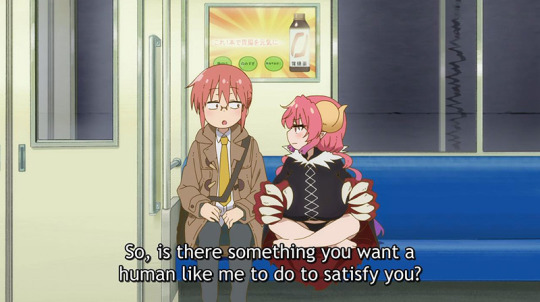

This translation makes some sense as a reader, but in the second image it’s actually そんな人間に納得させたいことでもあるの?, meaning the question Kobayashi is asking is more like “What are you trying to convince me—who you consider a puny human—of? [Why would you bother trying to convince me of anything?]” So, the convincer and convincee have been swapped. This explains why Ilulu's next line is "correct your understanding!" (意識を改めろ, or change/update how you think), as that's what she wants to convince Kobayashi to do.
Of course, since we can assume from Ilulu’s flashback etc. that deep down she really does want to be convinced, it’s easy to skim over this as making sense, but Kobayashi doesn’t necessarily have that context (though as the conversation continues we see she’s kind of sensed it), and would probably realize poking Ilulu’s sore spot like that, by immediately laying bare Ilulu’s unconscious desire, would be a bad idea even if she did.
(Japanese grammar mini-lesson: For those wondering if this is correct because it’s に instead of を: に vs を here is basically a question of indirect/direct objects; the subject remains Ilulu. You can say "IluluがKobayashiを納得させたい / Ilulu wants to convince Kobayashi" and "IluluがKobayashiにthe fact humans & dragons can't coexistを納得させたい / Ilulu wants to convince Kobayashi of the fact humans & dragons can't coexist," but if you wanted Ilulu to be the one being convinced in this structure, the verb would've had to be the passive 納得させられる.)
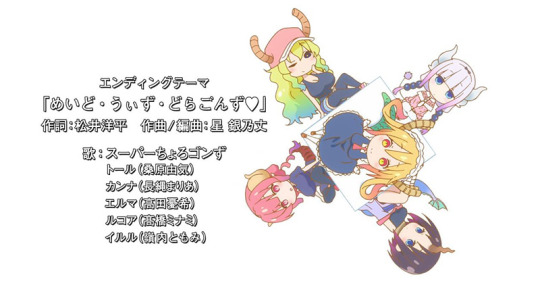
The ending theme めいど・うぃず・どらごんず♡ (made/maid with dragons['] (heart)) is shown as being sung by the the “Super Choro-gons,” referencing the choro-gon term also used in season one.

The word イケメン ikemen originated mostly as “a (certain type of) good-looking guy,” but has since expanded to include personality-based usages as well (to borrow an English meme, you could maybe call it having hot person energy? People who act in ways that make people fall for them naturally), and is not-uncommonly used to refer to people in both senses without regard to gender, at least in terms of "characters."
(Hence the “in many ways” here.)

腐った kusatta is rotten, but it can also (far less commonly) mean things like “feel bad” or “lose (a bet etc.).” I think here it’s just a funny way of putting something like “this week’s loser.”
It’s also a reference to season one episode ten, where Magical Girl Kanna tries to find the “rotten” people to cleanse the world of them (in a play).
まじやばい maji yabai was also touched on in an episode last season! Specifically ep 4. Here, it’s basically saying “oh, you’s screwed.”
A lot of Japanese fortunes of this type will have a “here’s something you can do to make your bad luck less bad.” In this case it’s “stay home, eat something tasty, then sleep,” hence Kobayashi’s jab that “oh come on, you just want an excuse to do that yourself.”
#kobayashi-san chi no maid dragon#miss kobayashi's dragon maid#maidragon#season 2#anime#translation notes
19 notes
·
View notes
Note
Hi! I was wondering what the "chi" in kobayashi-san chi no maid dragon means. What is it there for?
Hi! The -chi is basically short for “[no] uchi,” basically meaning household (/family, etc.). It’s used often when referring to stuff that “belongs” to the family, like a family member, pet, appliance, etc. (”my sister”, “our TV”, “your dog”).
Basically it takes it from “Kobayashi’s Maid Dragon” to a little more like “The Kobayashi Family’s Maid Dragon”.
41 notes
·
View notes
Note
Just wanted to say I really liked your KonoSub/a translations and to ask if you would consider finishing them
Glad you liked them! Unfortunately they’re pretty time-consuming to put together, but I’d like to get back to putting them out again soon. (been busy lately)
2 notes
·
View notes
Note
Just wanted to express my appreciation for your translation notes on Girlish Number, Konosuba and Gabriel Dropout! I'm conversational in Japanese but far from fluent and your notes are the perfect supplement for things I heard in the original Japanese that are lost in the subs, or things I missed entirely. お疲れさま!
Glad to hear you liked them! Hopefully I’ll be able to start putting them out again soon.
5 notes
·
View notes
Photo
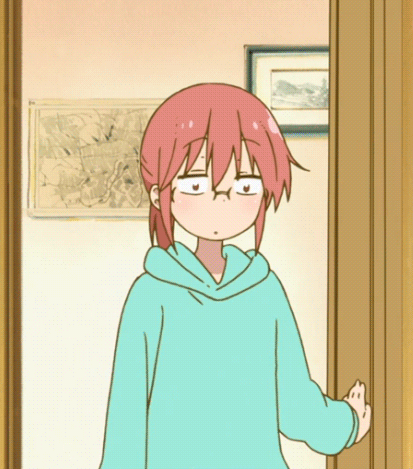
Hey how’s it goin’ in here? Doin’ alright? Good, good.
#kobayashi-san chi no maid dragon#miss kobayashi's dragon maid#maidragon#kanna#kobayashi#just poppin in to see whats up
234 notes
·
View notes
